Top DDQ Automation Software of 2026: A Detailed Comparison
Discover the top DDQ automation tools in 2026 reshaping vendor risk, compliance, and due diligence workflows with AI-powered precision.

A Due Diligence Questionnaire (DDQ) is a specialized document used by organizations to assess a vendor’s security, compliance, and operational risks before signing a contract.
As we see 30% of data breaches now linked to third-party vendors, double the rate of last year, buyers are increasingly using DDQs as a critical gatekeeper to ensure their partners meet strict security and compliance standards.
However, for many teams, the DDQ process becomes a burden, manual task, requiring repetitive data entry, hunting down certifications, and cross-checking every answer to ensure it’s accurate and up-to-date.
The result? A time-consuming, error-prone process that can slow down deals, increase stress, and ultimately delay business opportunities.
But here’s the good news: it doesn’t have to be this way. With the right DDQ automation software, you can simplify the entire process. By automating responses, centralizing your content, and ensuring compliance, you can speed up the process, reduce errors, and improve overall accuracy.
In this guide, we’ll walk you through the top DDQ software options for 2026. These tools are designed to simplify your workflows, save you time, and help you pass the due diligence hurdle faster, so you can focus on what truly matters: building stronger, safer partnerships.
Key Takeaways
- DDQ automation simplifies the process, saving vendors time and reducing errors by automating responses and ensuring compliance.
- Inventive AI leads the market with AI-powered responses, contextual accuracy, and real-time collaboration for improved speed and quality.
- AI-driven software like Loopio, AutoRFP, and Qvidian offer basic automation but lack advanced features like contextual accuracy and real-time collaboration.
- The right DDQ software can enhance efficiency, improve response quality, and help vendors stay ahead in a competitive market.
- Key features to look for: AI-powered response generation, centralized content libraries, and security/compliance management.
Top 8 DDQ Automation Software and Tools in 2026
Let’s understand more about all these DDQ Automation software in detail:
1. Inventive AI
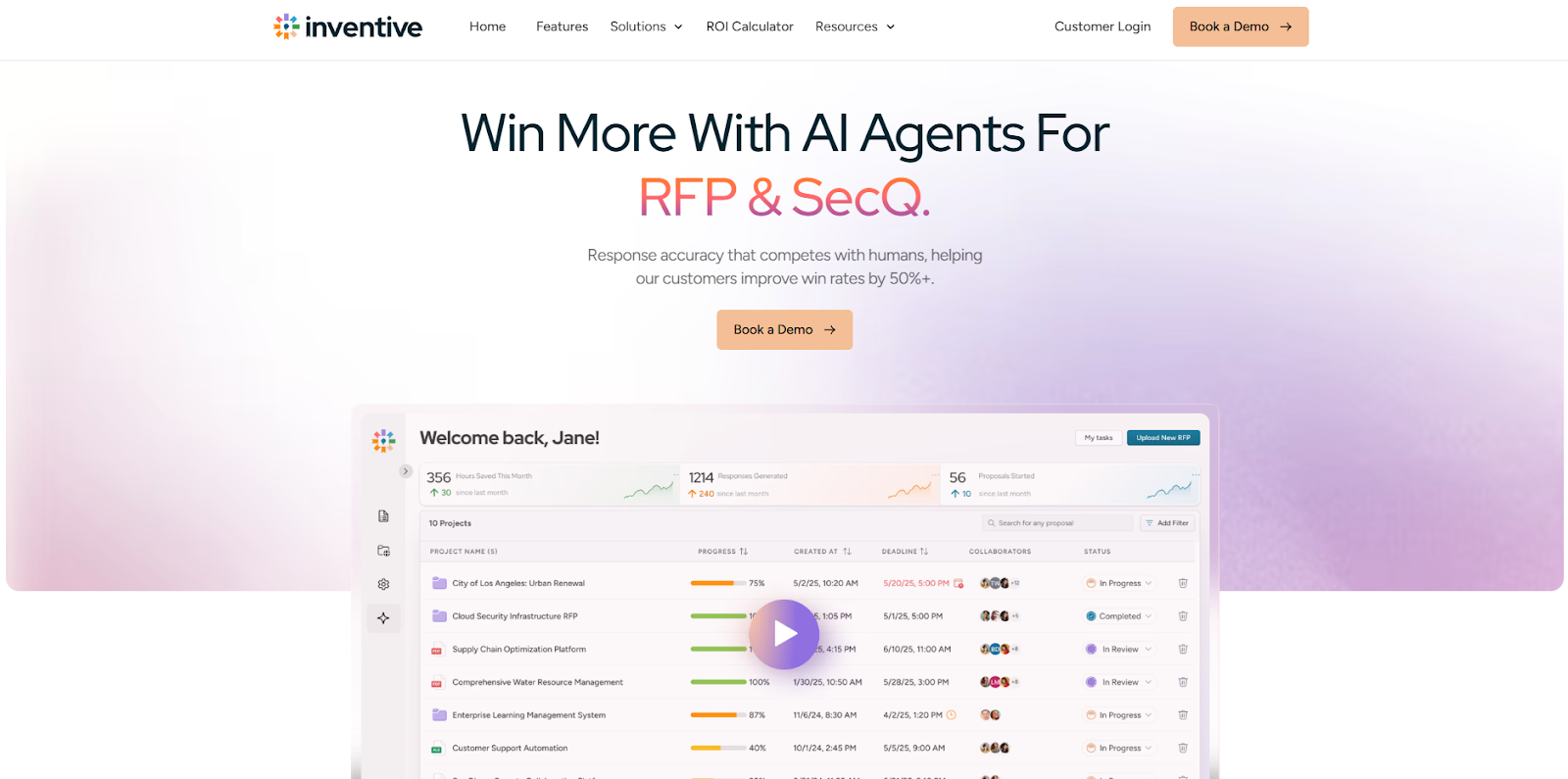
Inventive AI is the industry leader in DDQ automation, offering AI-powered hyper-contextual responses and real-time insights. It’s built to simplify workflows for security, compliance, and legal teams, automating the most complex parts of DDQs while improving response quality and speed.
Inventive AI is the best in the industry, transforming how vendors handle DDQs, making it the top solution for vendors looking for efficiency and precision.
Features
- 2× Better Response Quality
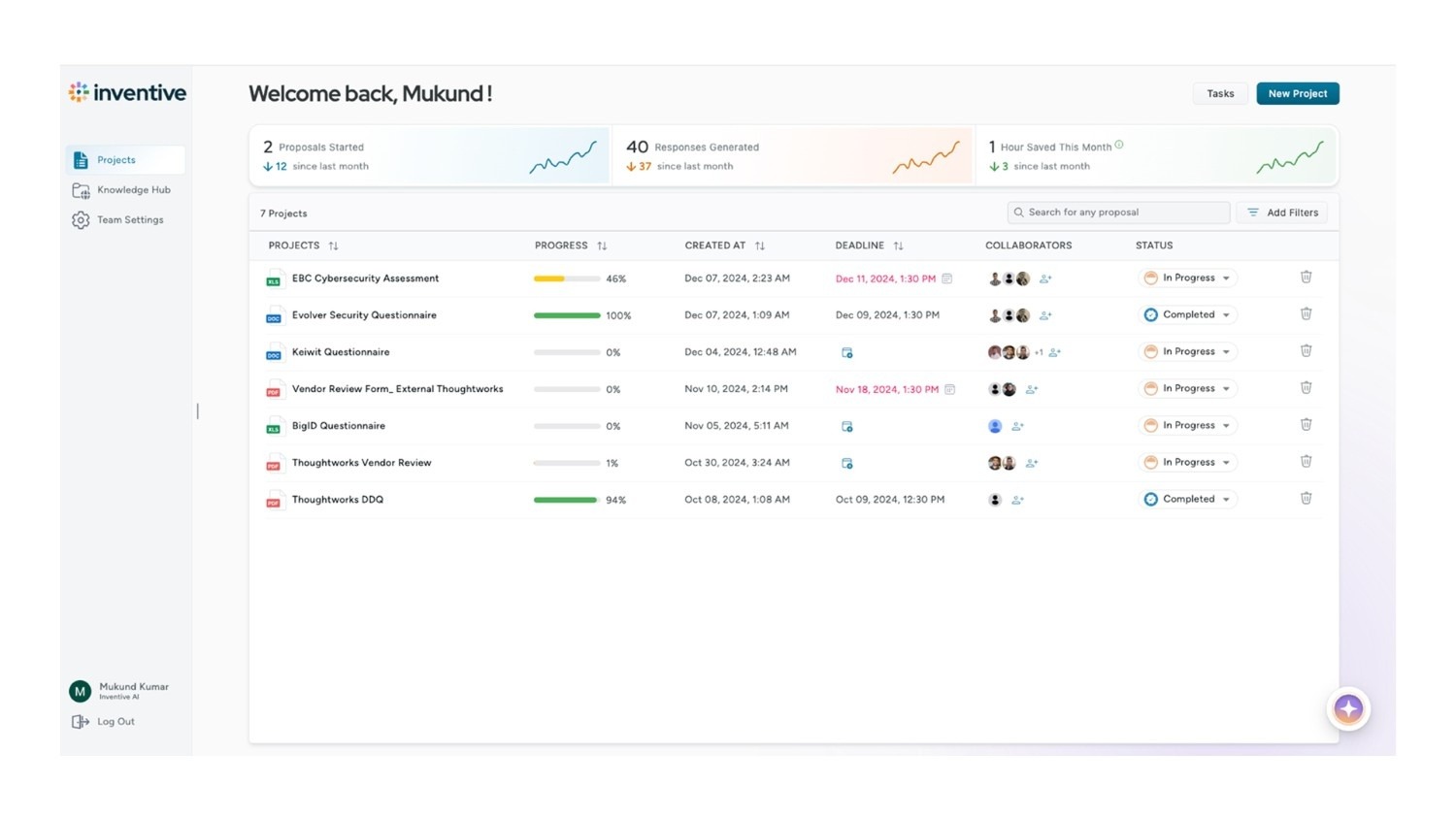
- Inventive AI delivers consistently higher-quality DDQ responses by understanding intent, context, and required depth, not just matching keywords. This leads to clearer, more complete answers that buyers trust.
- Context Engine for Accurate, Tailored Responses
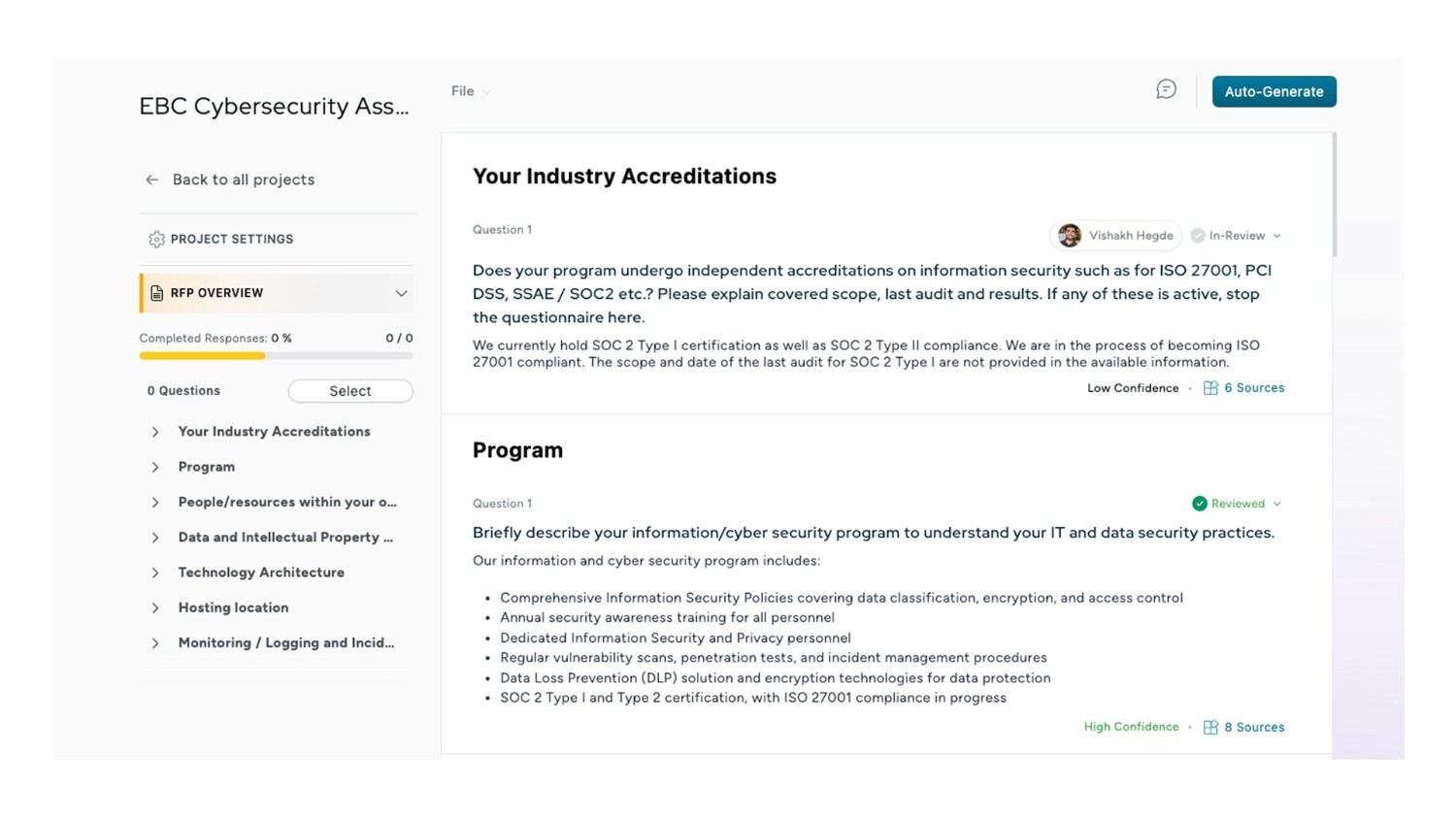
- Instead of generic answers, Inventive AI uses a multi-layer context engine to generate responses that match the specific customer, question format, and compliance requirement, reducing rewrites and follow-ups.
- Instant Conflict Detection
- Inventive AI automatically flags contradictory or inconsistent answers across your DDQ responses, helping you avoid risky submissions and last-minute corrections during security reviews.
- Real-Time Content Accuracy
- As policies, certifications, or controls change, Inventive AI identifies outdated responses and alerts you before submission, ensuring every DDQ reflects your latest security and compliance posture.
- Quality Benchmarking for High-Standard Responses
- Each response is evaluated against internal quality benchmarks to check for completeness, clarity, and accuracy, helping you maintain a consistent standard across all DDQs.
- Generate Narrative-Style Proposals
- Beyond Q&A, Inventive AI helps you create narrative outputs like security summaries, executive overviews, and compliance narratives, making it easier to support DDQs with clear, buyer-friendly context.
What Makes Inventive AI Stand Out:
- 10× Faster Responses: Generate DDQ answers quickly with confidence indicators that show which responses are ready to submit and which need review.
- Reliable Compliance Answers: Ensure every response stays aligned with your latest security policies and compliance standards.
- Built-In Reviews and Audit Trails: Manage reviews, approvals, and change history in one place without chasing emails.
- Single Source of Truth: Store all approved DDQ, security, and legal content in one centralized, searchable hub.
Limitations of Inventive AI:
- Limited Analytics Features
Pricing of Inventive AI
Best for:
- High-Volume DDQ Workflows where dozens of questionnaires require consistent, vetted responses across teams.
- Cross-Functional Collaboration across security, legal, compliance, and sales engineering, with built-in reviews and audit trails.
- Regulated Industries such as finance, healthcare, and tech, where compliance accuracy and up-to-date security posture matter.
- Narrative Reporting Needs where you need not just Q&A but also executive summaries, security narratives, and proposal-ready wording.
Reviews and Ratings
Ratings: 5/5
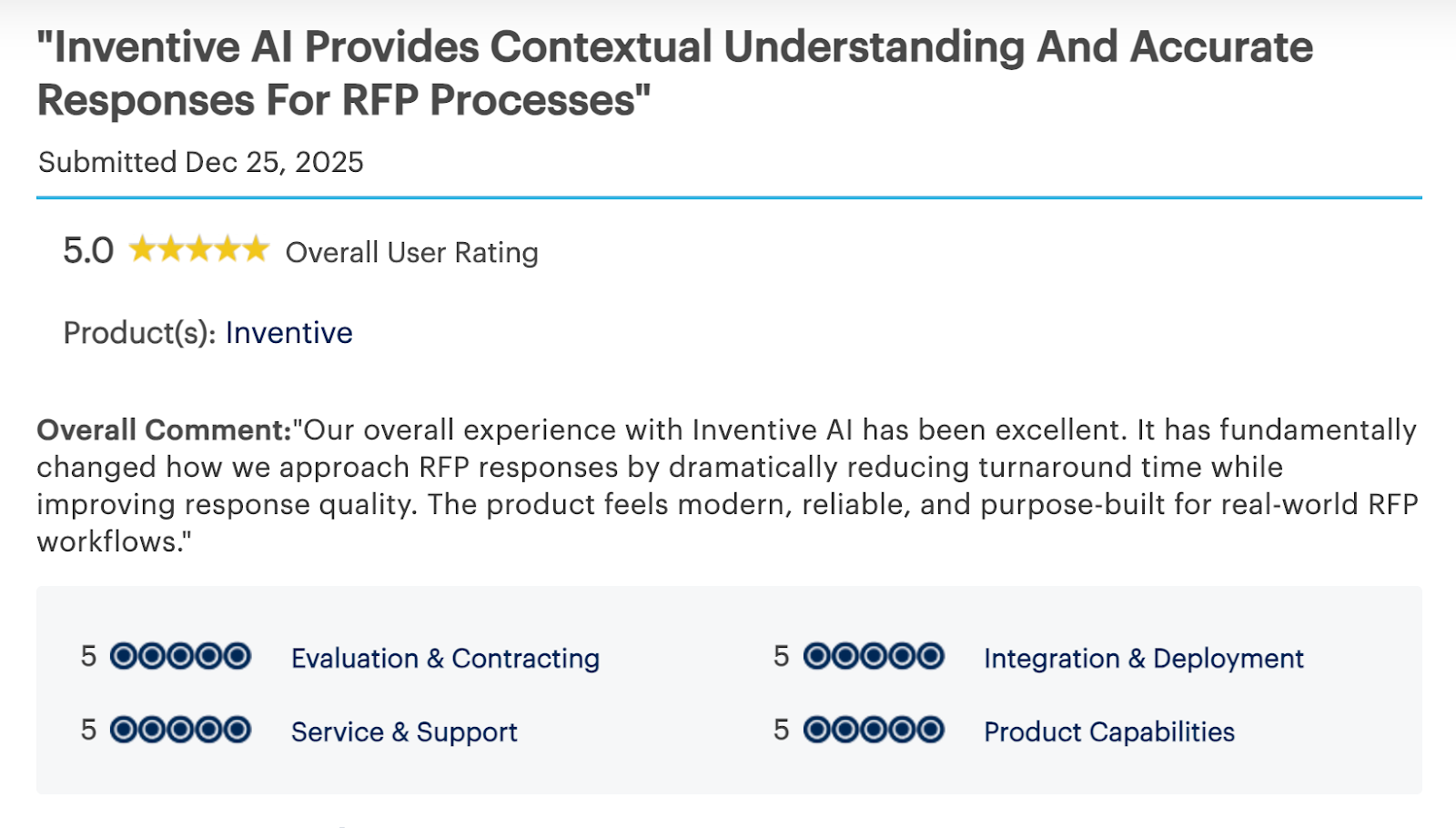
Inventive AI is the clear industry leader, offering unmatched speed, accuracy, and security for DDQ responses. If you’re a vendor looking for efficiency at scale, this tool should be your go-to choice.
2. Loopio
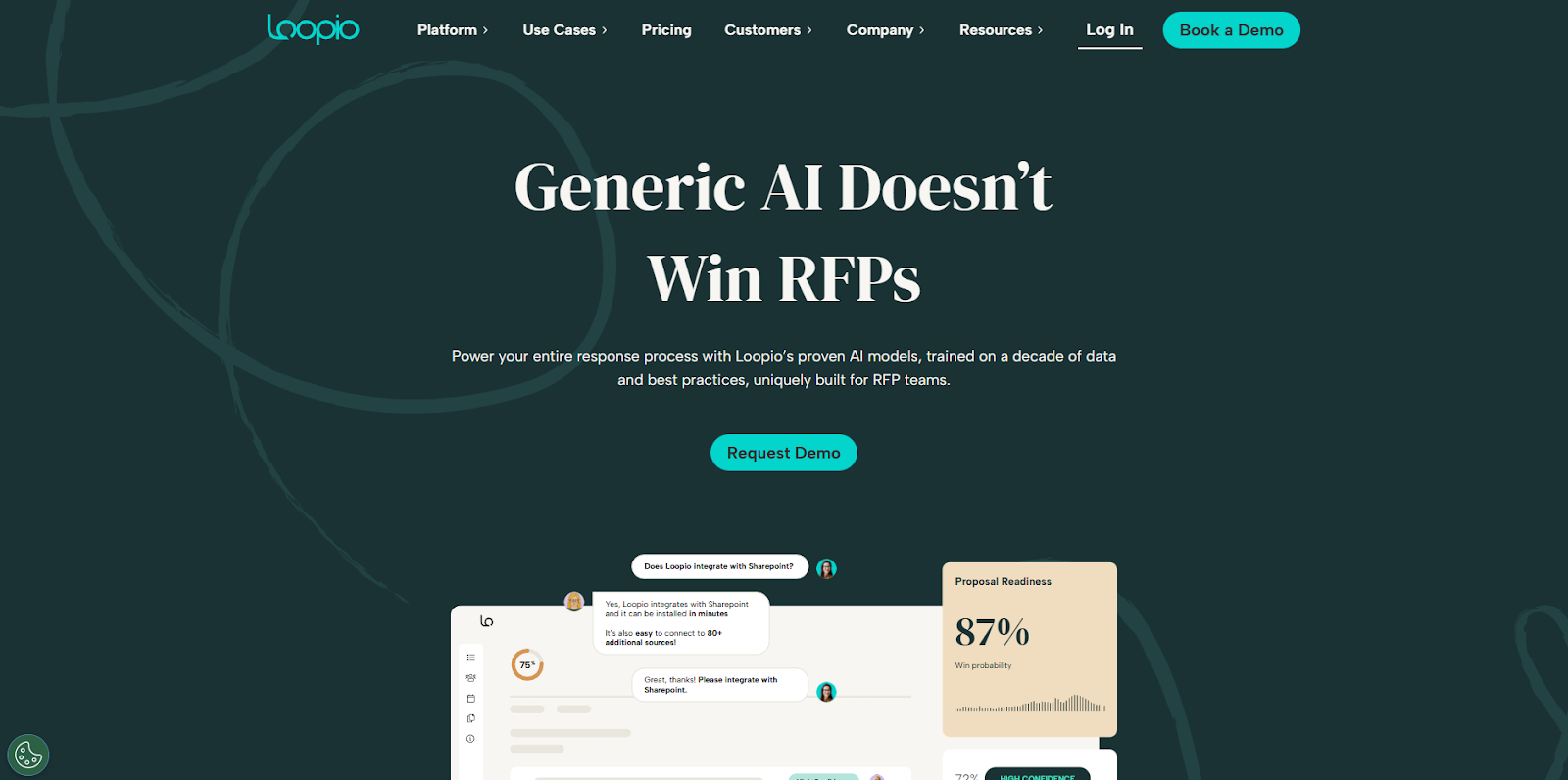
Features
- Centralized Content Library
- Loopio stores previously approved DDQ and RFP answers, policies, and standard language in a single repository. This allows teams to reuse consistent, vetted content across multiple questionnaires and avoid rewriting the same responses repeatedly.
- Answer Suggestions
- The platform suggests responses based on keyword matching and similarity to past answers in your library. This helps speed up drafting, but accuracy depends heavily on how complete and well-maintained the library is.
- Team Collaboration Tools
- Loopio enables multiple contributors to work on a single DDQ at the same time. Teams can assign questions, leave comments, and track progress, making it easier to coordinate across sales, security, legal, and compliance stakeholders.
What Makes Loopio Stand Out:
- User-friendly interface: The platform is relatively easy to learn, even for new users, with a clean layout and guided workflows.
- Strong content organization: Its library structure makes it easier to manage and categorize approved responses over time.
The Limitations of Loopio:
- AI suggestions rely heavily on existing content: Loopio can only suggest answers based on what already exists in your library. When questions are new, customer-specific, or phrased differently, teams often have to search manually, rewrite responses, or pull in SMEs, which reduces the expected time savings.
- Ongoing effort to build and maintain the content library: Creating a dependable library takes significant time, especially for security and compliance content. As policies and certifications change, teams must manually update answers to avoid sending outdated or inconsistent responses.
- Search results often need careful review: Keyword-based matching can return answers that seem relevant but don’t fully address the question. This increases review time and adds extra checks for security, legal, or compliance teams.
- Export formatting adds last-minute work: Responses may need formatting adjustments after export to match customer templates, slowing down submission when teams are trying to move quickly.
Pricing
Best for
Mid-sized teams that already have a well-maintained content library and need structured collaboration for RFPs and DDQs.
Reviews and Ratings
Ratings: 4.4/5
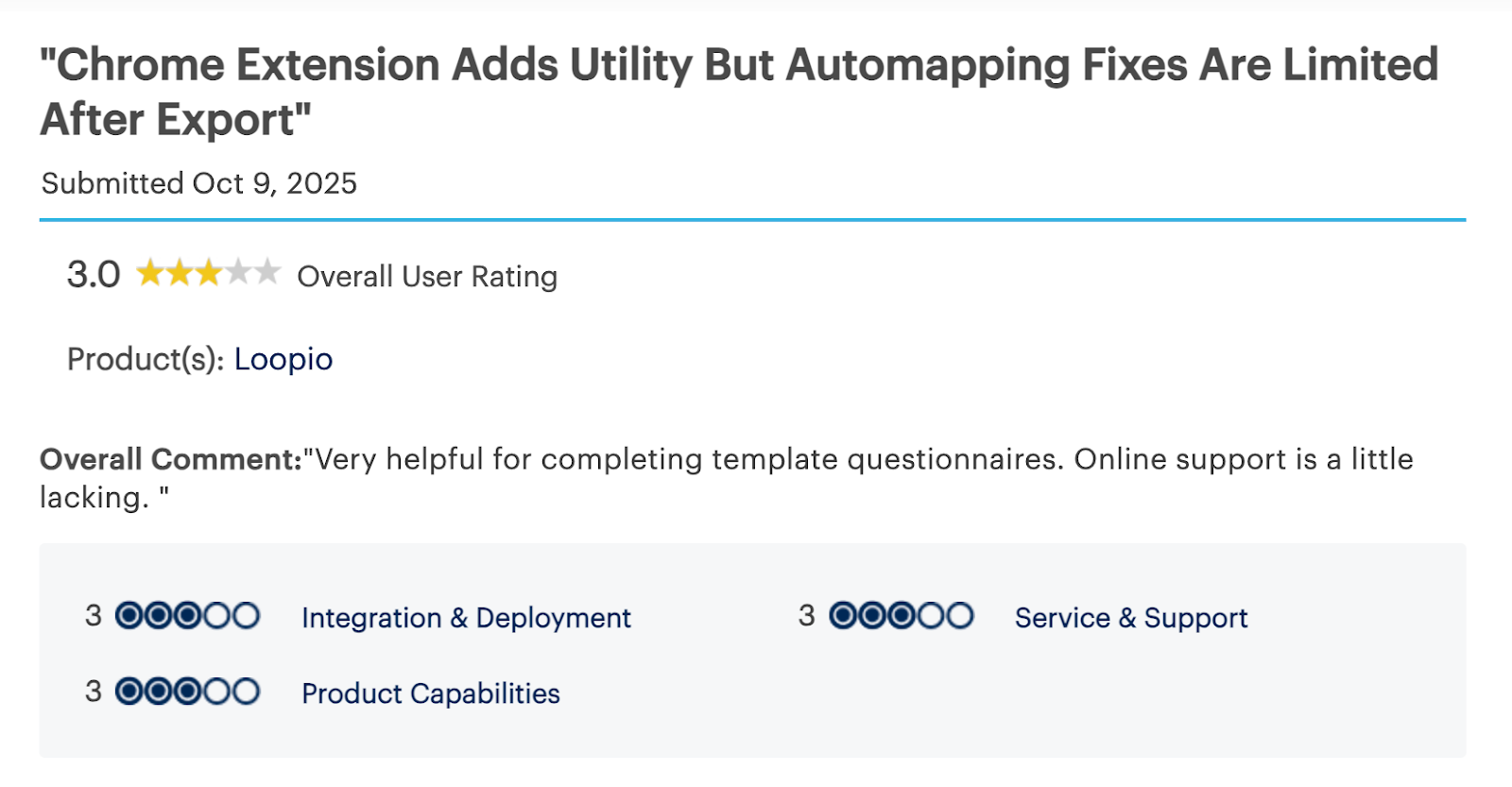
While Loopio provides strong collaboration features, it lacks some of the advanced AI capabilities of other tools. Good for smaller teams but may struggle with larger workflows or faster response times.
3. Responsive
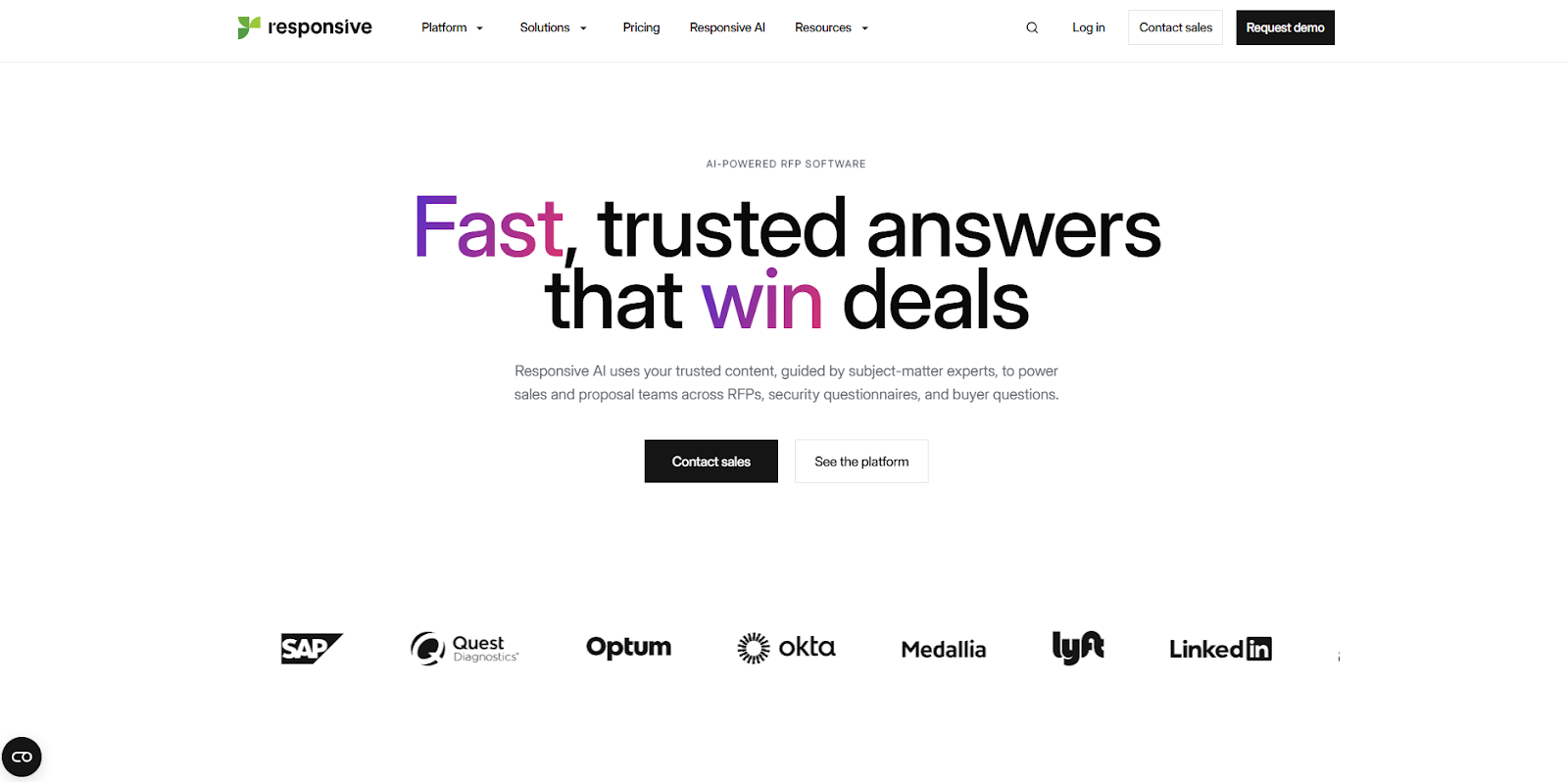
Features
- Centralized Document Management
- Responsive stores approved answers, policies, and reference documents in a shared repository. This allows teams to pull from past responses when answering DDQs, reducing repetitive work across similar questionnaires.
- Automated Response Generation
- The platform generates draft responses using previously approved content. This helps speed up initial drafts, especially for commonly asked DDQ questions, but still requires manual review for accuracy.
- Basic Reporting Features
- Responsive provides visibility into response progress, assignments, and completion status. Teams can track who owns each section and where responses are delayed.
What Makes Responsive Stand Out:
- Easy to use for standard workflows: The interface is straightforward and works well for teams already familiar with RFP-style tools.
- Good for repeatable questionnaires: Responsive performs well when DDQs follow similar formats and questions appear frequently.
The Limitations of Responsive:
- Limited contextual understanding in responses: The AI relies mainly on existing content and does not deeply interpret question intent. When questions are phrased differently or require nuance, responses often need manual rewriting.
- Search accuracy can slow reviews: Search results may return content that is only partially relevant, increasing review time for security and compliance teams.
- Analytics are surface-level: Reporting focuses on task completion rather than response quality, gaps, or risk areas, limiting insight for process improvement.
- Onboarding takes time: Initial setup and content organization can be slow, especially for teams without a clean content base.
Pricing
Best for
Small to mid-sized teams managing RFPs and basic DDQs with structured, repeatable questions.
Reviews and Ratings
Ratings: 4.3/5
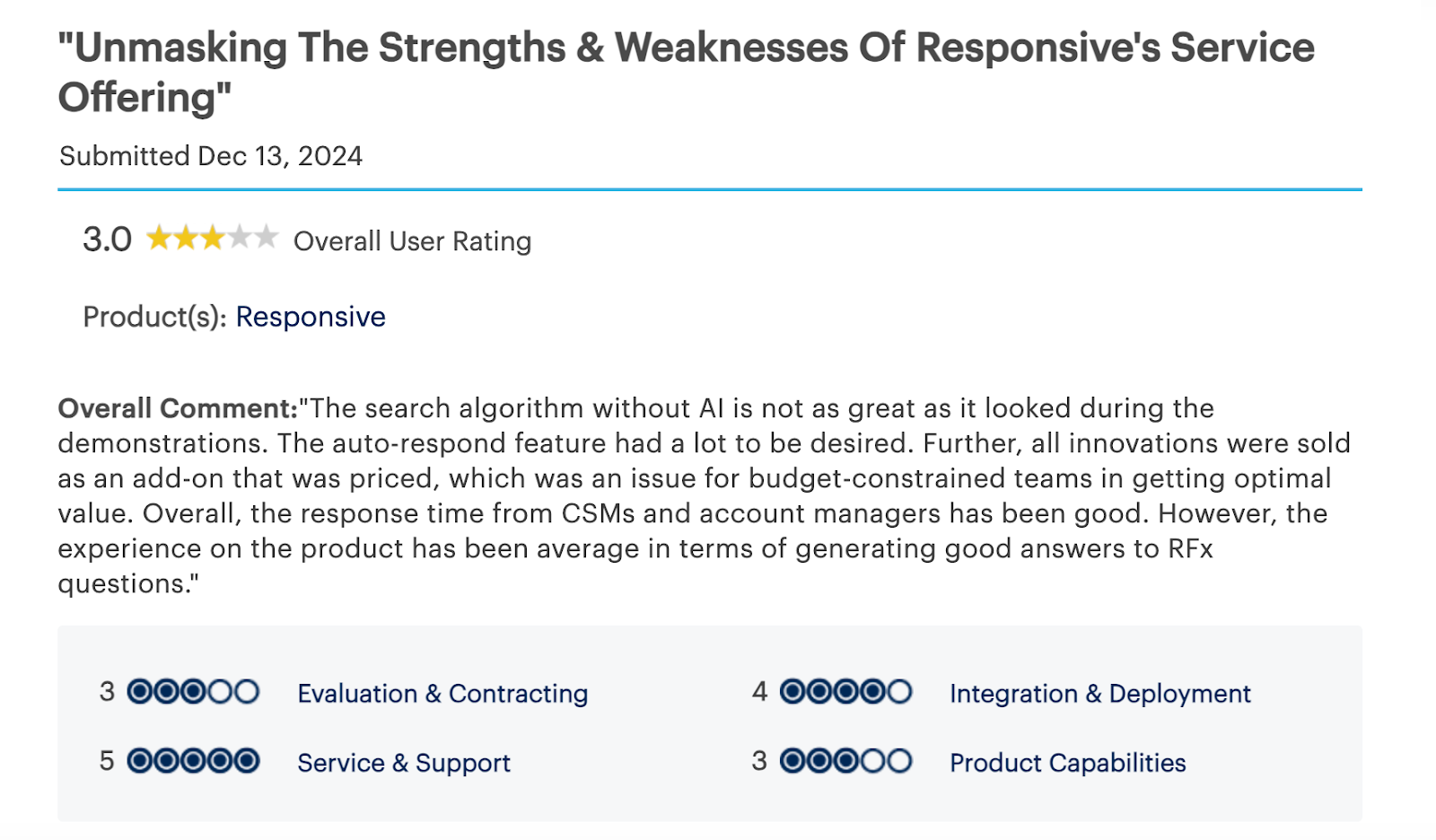
Suggested Alternative: Inventive AI
Responsive offers a good solution for small teams, providing automation and centralized content management. However, it may face challenges when scaling to larger teams or more complex workflows, particularly in areas like AI-driven context and real-time insights.
Inventive AI, on the other hand, improves the process with its advanced contextual AI, real-time content detection, and smooth integration, enabling enterprise teams to handle high volumes of proposals efficiently and accurately, with faster response times and higher-quality outputs.
4. AutoRFP
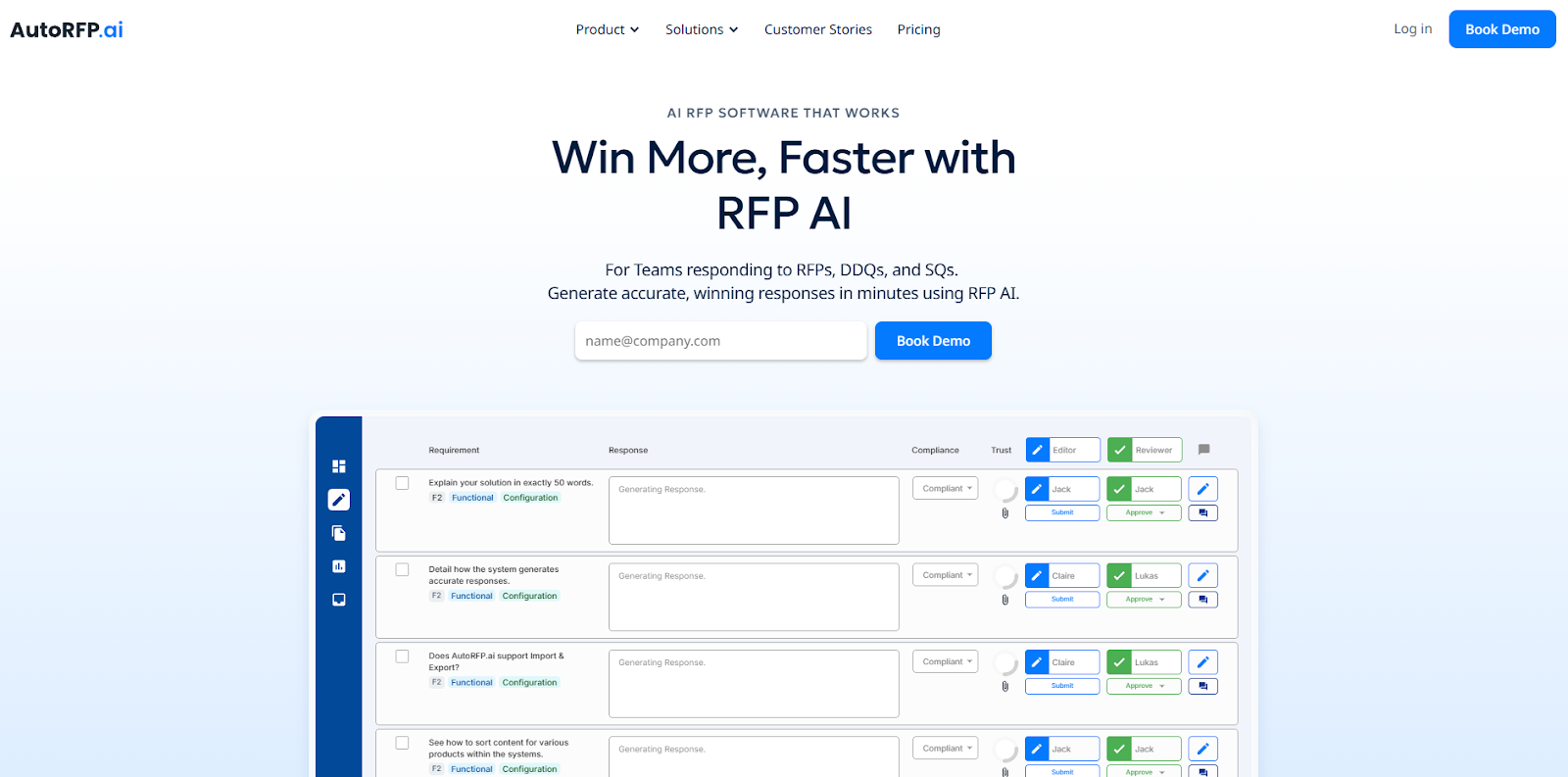
Features
- AI-Assisted Response Generation
- It uses AI to generate draft answers by matching the intent of a question with relevant content from your existing library or uploaded documents. This helps teams get to a first draft faster, especially for recurring DDQ questions.
- Content Reuse and Automation
- The platform allows teams to store approved responses and reuse them across multiple questionnaires. This reduces repeated writing and helps keep responses consistent when the same topics appear across different DDQs.
- Semantic Search for Question Matching
- Instead of relying only on keywords, AutoRFP uses semantic search to find answers that match the meaning of a question. This helps when questions are phrased differently but are asking for the same information.
What Makes AutoRFP Stand Out:
- Faster drafts for common questions: It can generate usable first drafts for routine DDQ questions, reducing the time spent writing from scratch.
- Helpful when questions follow predictable patterns: The platform performs best when DDQs include standard security, compliance, or company background questions.
- Better matching for rephrased questions: Semantic search improves relevance compared to basic keyword-based tools.
The Limitations of AutoRFP:
- Limited support for complex compliance questions: When DDQs include detailed, customer-specific, or multi-part compliance questions, responses often need manual rewriting.
- Integrations are fairly limited: AutoRFP does not deeply integrate with compliance systems or policy management tools, which can lead to extra manual work.
- Cost can be high for smaller teams: With pricing starting at around $899 per month, teams with lower DDQ volume may find it harder to justify the expense.
- No built-in evidence or audit workflows: Teams still need separate processes to manage supporting documents, approvals, and audit tracking.
Pricing
Best for
Vendors handling moderate volumes of repetitive DDQs who want faster first drafts and improved answer matching without heavy compliance workflow requirements.
Reviews and Ratings
Ratings: 4.9/5
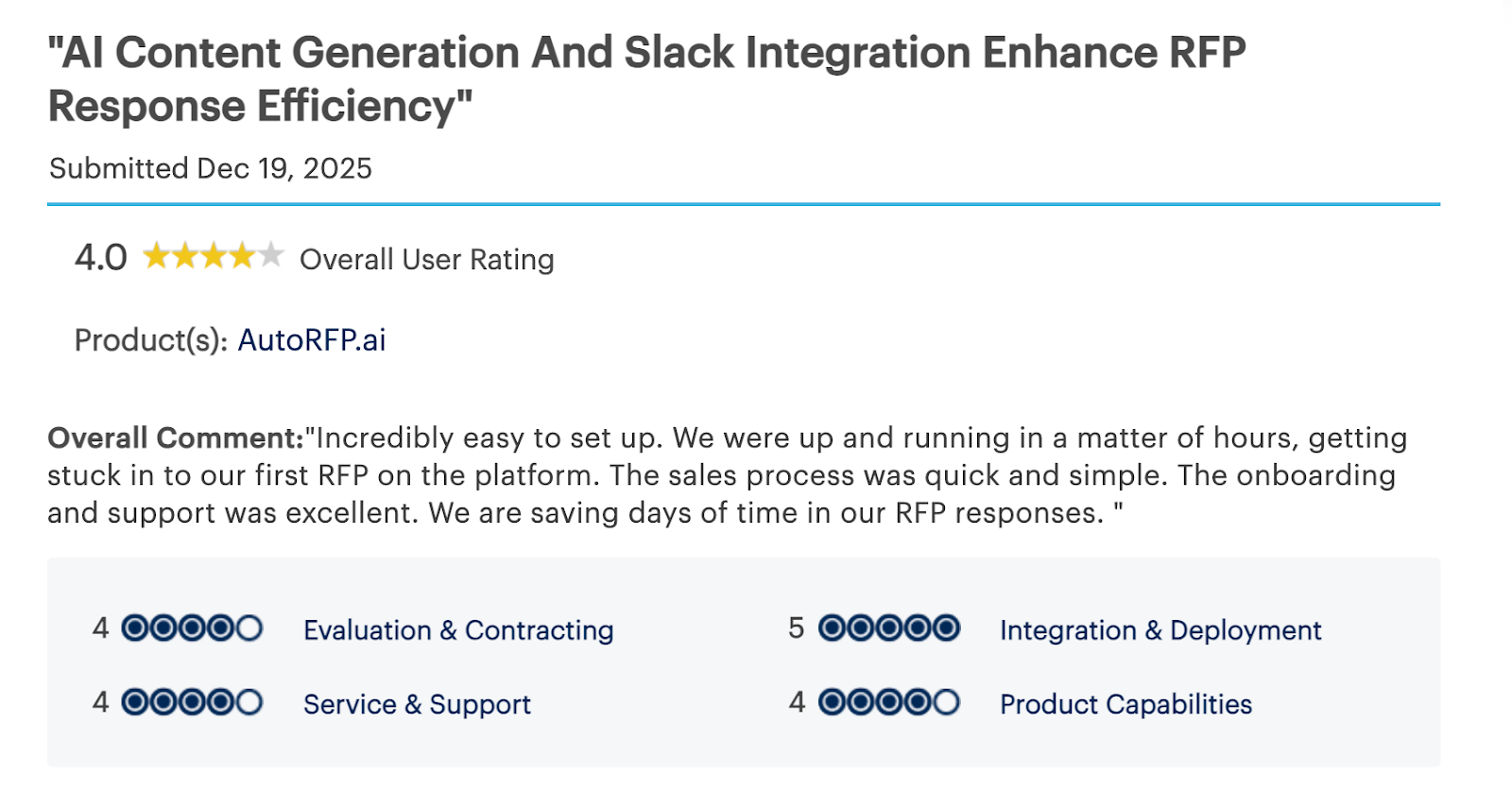
AutoRFP is good for small teams handling standard DDQs but falls short when managing more complex vendor assessments. It lacks the scalability and integration options found in other tools.
5. Autogen
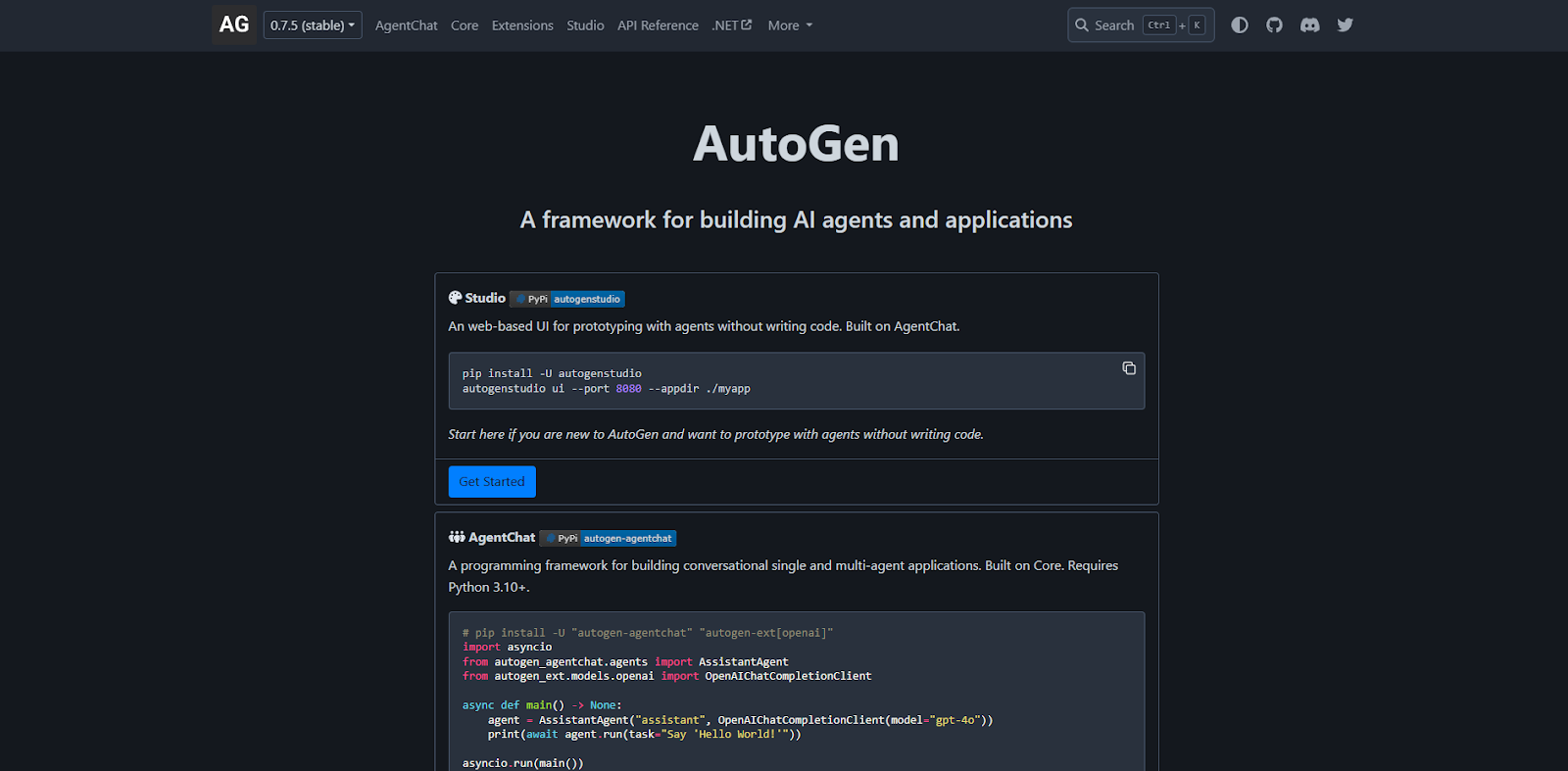
Features
- Long-Form AI Response Generation
- Autogen generates written responses using AI based on prompts or uploaded context. This is useful when DDQs include descriptive or narrative questions that require complete written explanations rather than short, structured answers.
- Basic Content Storage
- The tool allows teams to save generated responses and reuse them later. This helps reduce repeated writing for similar questions, though the reuse process is mostly manual.
- Simple Workflow Tracking
- Autogen provides limited tracking for drafts and completed responses, helping teams keep basic visibility into what has been answered and what still needs work.
What Makes Autogen Stand Out:
- Quick to start using: It requires little setup. Teams can begin generating responses without building a large content library upfront.
- Helpful for drafting narrative answers: It works well when DDQs ask for explanations about processes, policies, or high-level security practices.
- Reduces writing effort for small teams: For teams without dedicated proposal or compliance resources, Autogen can help produce first drafts faster.
The Limitations of Autogen:
- Not designed for DDQ or compliance workflows: Autogen does not understand DDQ structure, compliance frameworks, or evidence requirements. Responses often need manual checking to ensure accuracy and completeness.
- Limited content reuse and consistency: Because reuse is manual, teams may end up sending slightly different answers to similar questions, increasing review effort and risk.
- No built-in collaboration or approvals: There are no native tools for routing questions to SMEs, reviewing answers, or maintaining audit trails, which becomes a challenge as more teams get involved.
- Does not scale well for higher volumes: As the number of DDQs increases, manual review and coordination can quickly outweigh the time saved from AI drafting.
Pricing
Best for
Very small vendor teams that need help drafting written DDQ responses but do not require structured compliance workflows or multi-team collaboration.
Reviews and Ratings
Ratings: 4.5/5
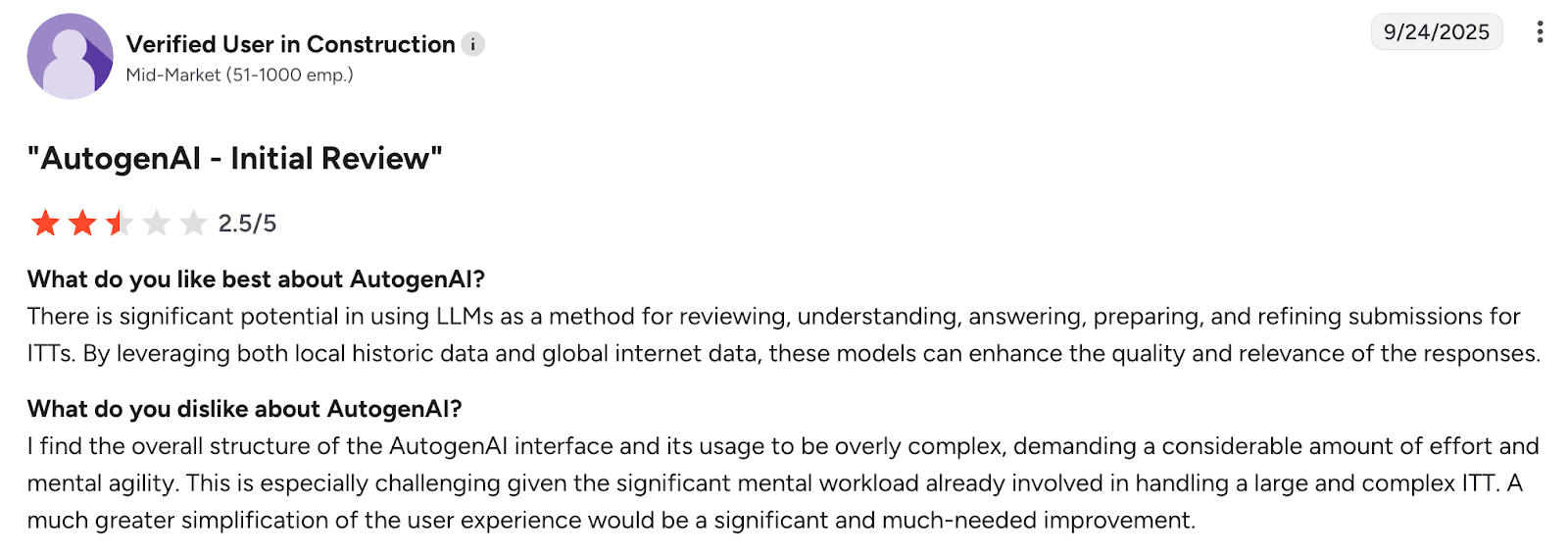
Autogen offers basic automation for long-form content generation but doesn’t specialize in DDQ automation. For teams with more complex needs, it may not offer the depth or speed needed.
6. Arphie
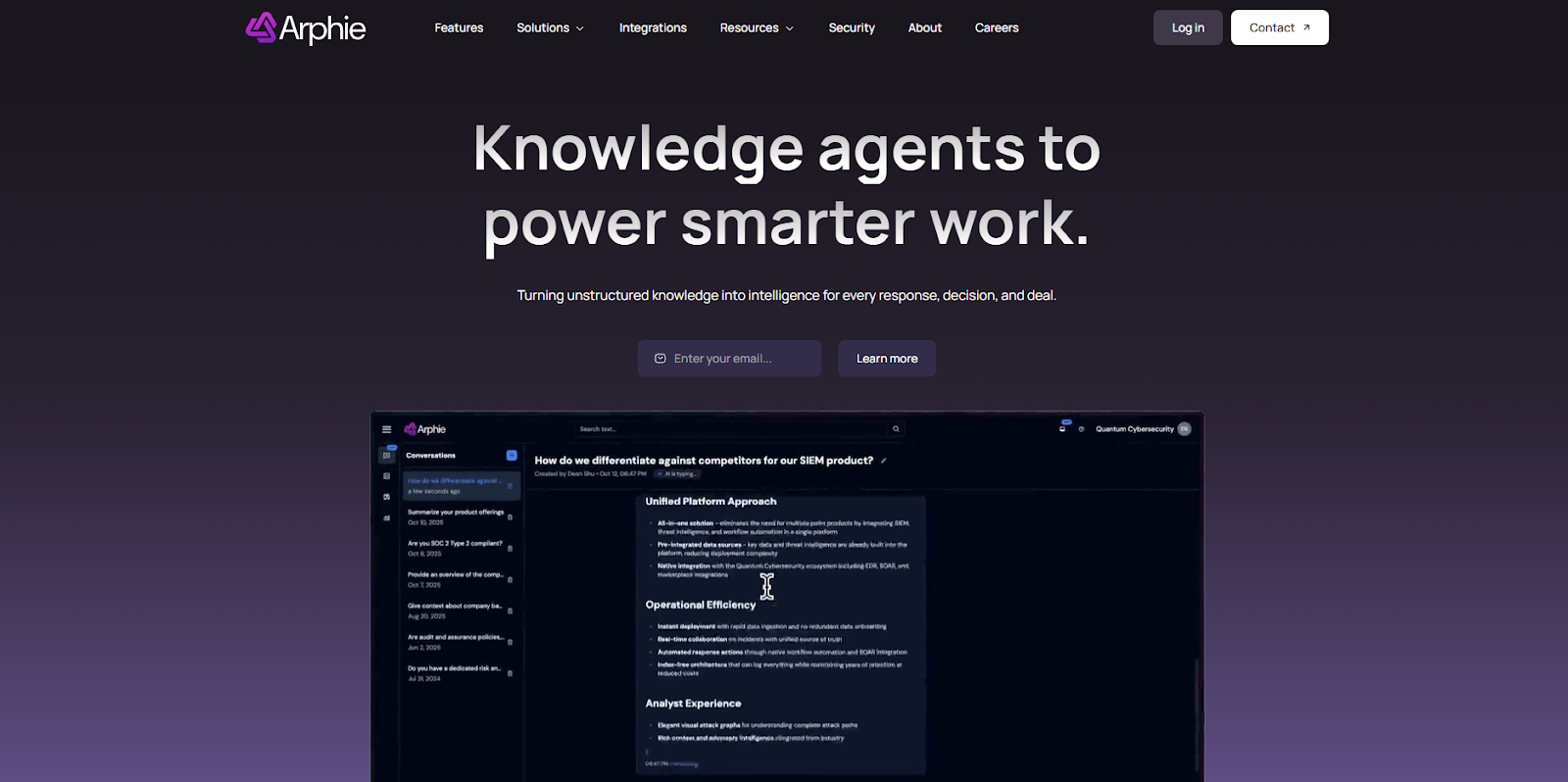
Features
- AI-Assisted DDQ Response Drafting
- Arphie uses AI to suggest draft responses based on previously stored answers and uploaded documents. This helps teams get an initial response quickly for common DDQ questions, especially those that appear repeatedly across customers.
- Reusable Content Library
- The platform allows teams to store approved answers and reuse them across questionnaires. This reduces repetitive writing and helps maintain a level of consistency for standard security and compliance questions.
- Basic Workflow Management
- Arphie includes simple workflow features such as task assignments and progress tracking. Teams can see which questions are assigned, in progress, or completed during a DDQ response cycle.
What Makes Arphie Stand Out:
- Reduces effort for repeat questions: By reusing stored answers and suggesting drafts, Arphie can cut down manual work for commonly asked DDQ questions.
- Simple interface: The platform is easy to use, which helps teams stay productive without extensive training or onboarding.
The Limitations of Arphie:
- AI responses lack deeper context: Arphie’s AI primarily pulls from existing content and does not fully understand question intent. When DDQs include nuanced, customer-specific, or compliance-heavy questions, teams often need to manually revise responses.
- Workflow controls are limited: While basic task tracking exists, Arphie does not offer strong review, approval, or audit trail features. This becomes a challenge when multiple teams like security, legal, and compliance need to review answers.
- Limited integrations increase manual work: Arphie does not deeply integrate with compliance tools or document management systems, which can lead to copying content between platforms and potential version issues.
- Does not scale well for higher DDQ volumes: As DDQ volume grows, manual review and coordination effort can increase faster than the automation benefits, reducing overall efficiency.
Pricing
Best for
Small vendor teams handling low to moderate volumes of standard DDQs who want basic AI assistance without complex compliance workflows.
Reviews and Ratings
Ratings: 5/5
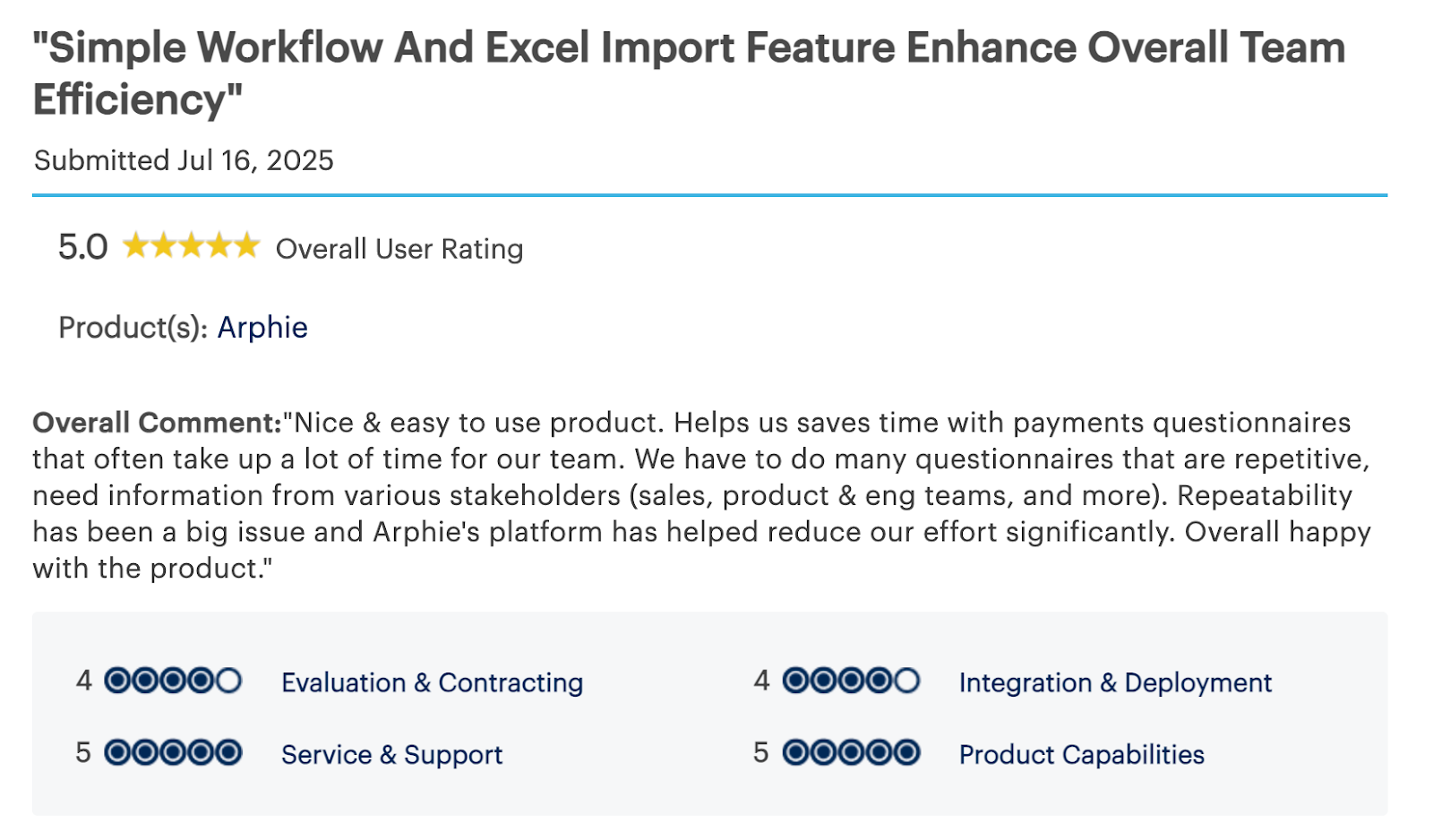
Arphie offers a simple solution for small teams but lacks the advanced AI and integration features needed for larger, more complex workflows. It's a basic tool, best suited for simpler DDQs.
7. Qvidian
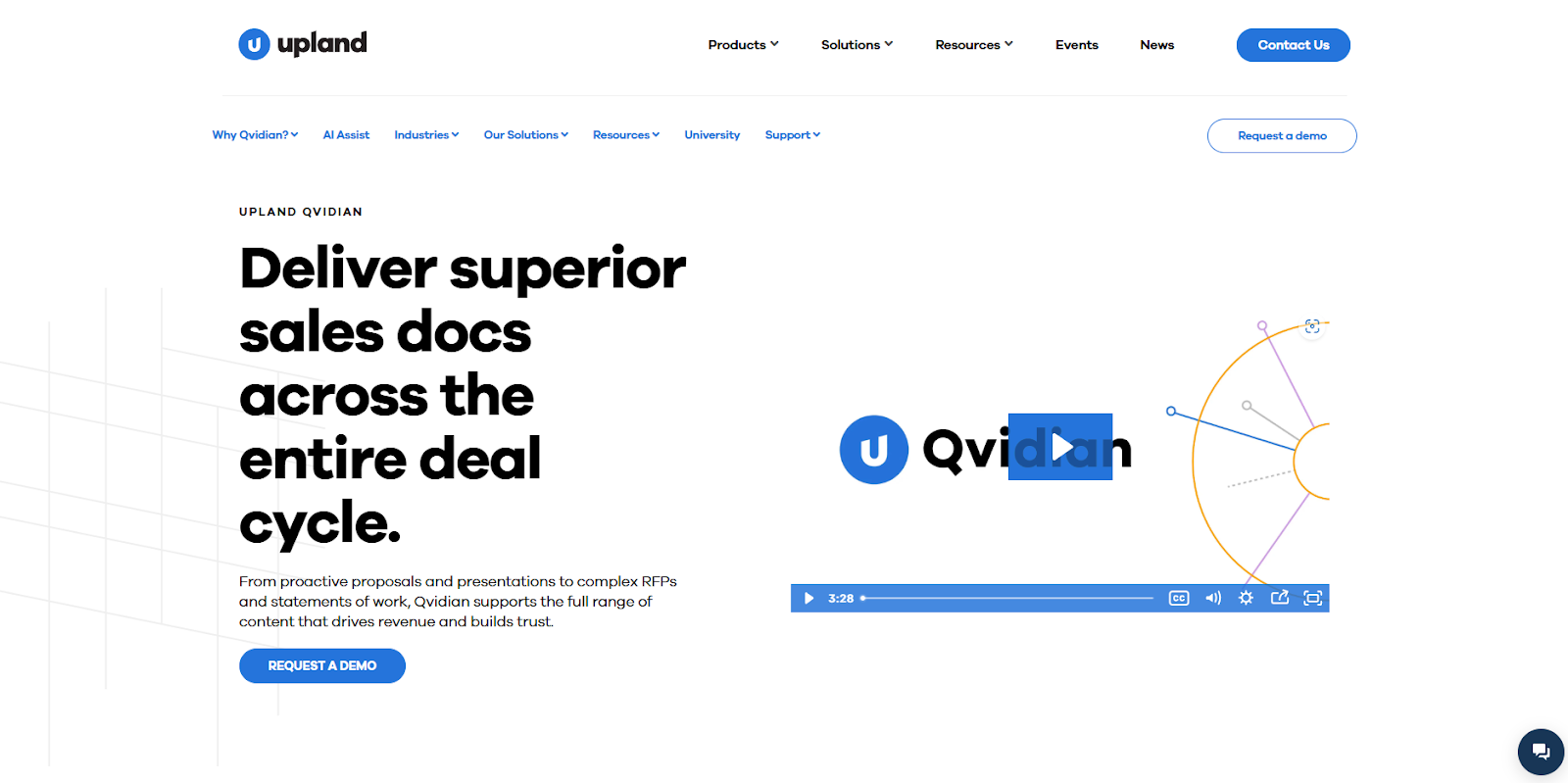
Features
- Content Management Library
- Qvidian stores approved responses, templates, and reference documents in a centralized repository. Teams can reuse this content across RFPs and DDQs, helping maintain consistency when the same information is required repeatedly.
- Basic RFP and DDQ Automation
- The platform supports structured questionnaires by allowing teams to insert predefined content blocks into responses. This works well for DDQs with predictable formats and repeated questions.
- Reporting and Analytics
- Qvidian provides basic reporting on content usage and response activity. Teams can see which templates are used most often and track progress across responses.
What Makes Qvidian Stand Out:
- Flexible and customizable templates: Qvidian allows teams to build detailed templates that align with their internal response standards, which can be helpful for organizations with formal proposal processes.
- Works well for standardized responses: When DDQs follow consistent formats and require little variation, Qvidian helps teams reuse content efficiently without starting from scratch.
The Limitations of Qvidian:
- Onboarding and setup can be time-consuming: Getting Qvidian fully configured often requires significant upfront effort. Teams need to define templates, organize content libraries, and train users, which can slow adoption and delay time-to-value.
- Search and content structure require expertise: Finding the right response often depends on knowing how content is categorized within the system. This can be challenging for new users and increases reliance on experienced team members.
- Updating content is manual and labor-intensive: When policies, certifications, or compliance language change, updates must be made manually across templates and libraries. This increases the risk of outdated responses being reused if updates are missed.
- Limited AI support for DDQ automation: Qvidian does not offer deep AI-driven context understanding. For DDQs that are phrased differently or require tailored explanations, teams often need to manually adjust responses, reducing speed and efficiency.
Pricing
Best for
Teams with highly standardized RFP and DDQ processes that rely on templates and are comfortable managing content manually.
Reviews and Ratings
Ratings: 4.7/5
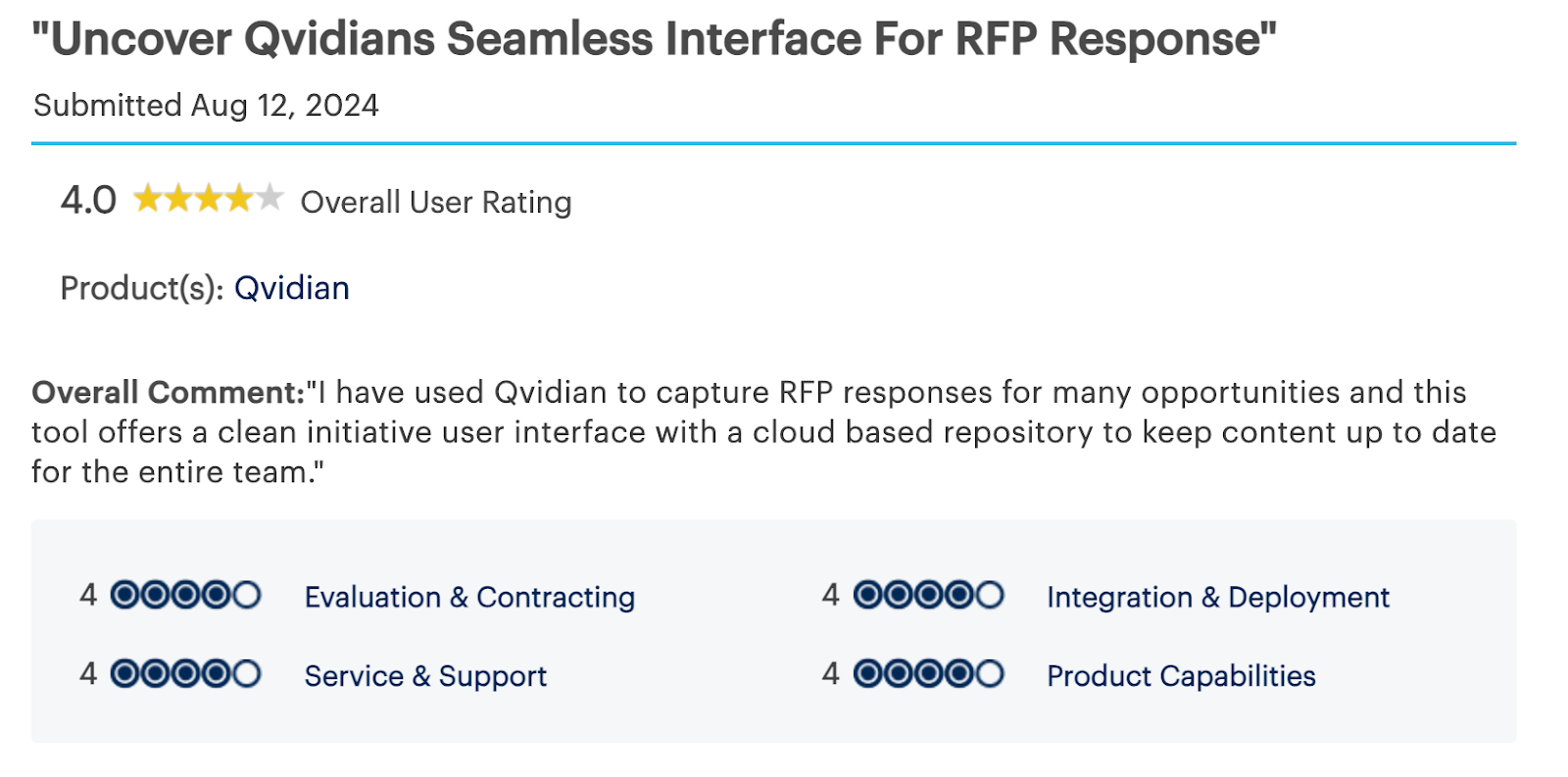
Suggested Alternative: Inventive AI
Qvidian provides a content management foundation, but it lacks the advanced AI-driven context and automation capabilities found in Inventive AI, which are needed for faster and more accurate DDQ responses. It is better suited for teams that rely on standardized templates and predictable questionnaires rather than highly tailored, high-velocity DDQ workflows.
8. 1Up
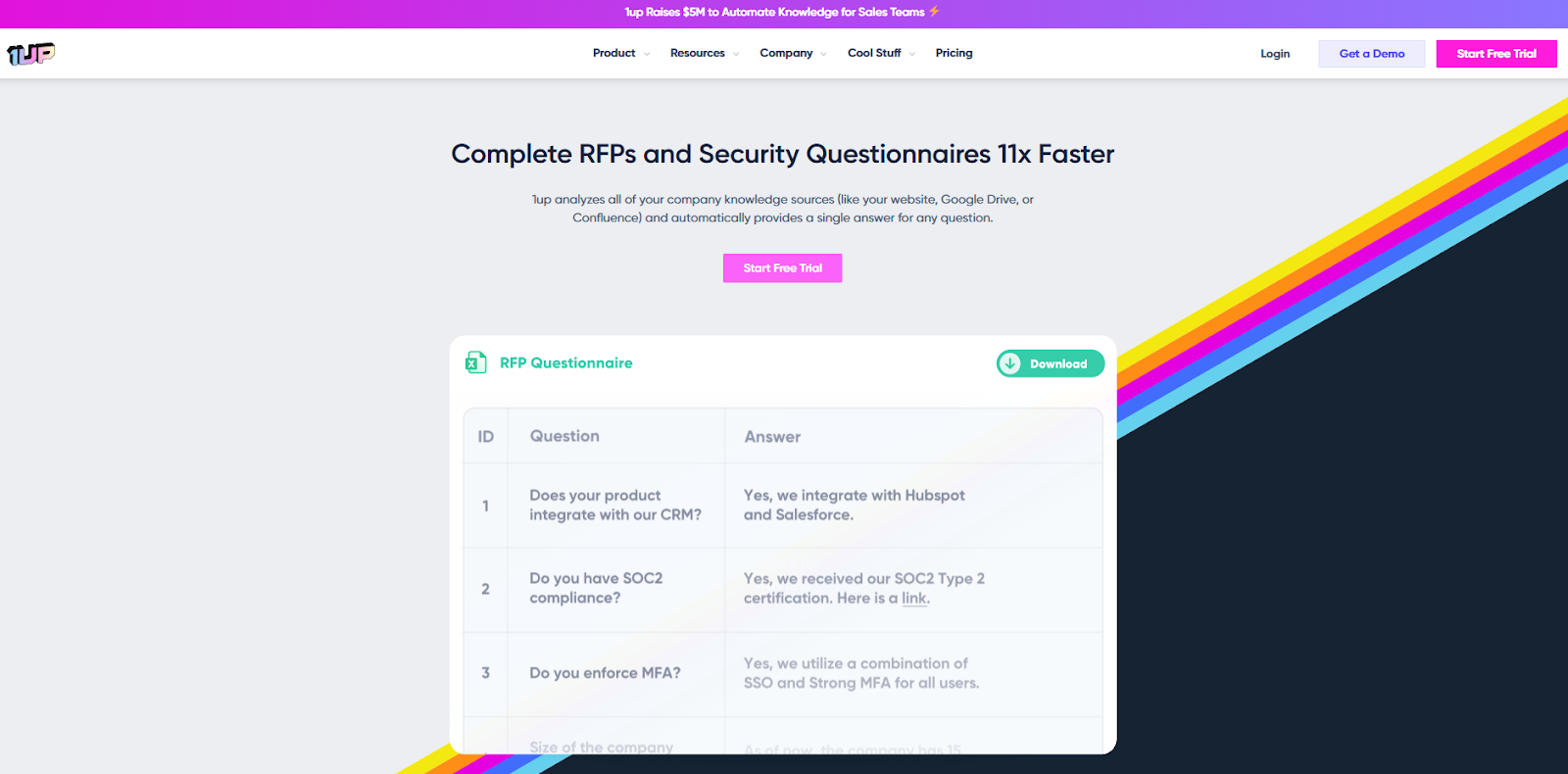
Features
- Basic AI-Powered Response Generation
- It uses AI to generate draft responses based on previously stored content. This helps teams avoid writing answers from scratch for commonly asked questions, especially in simple DDQs.
- Automated Content Reuse
- The platform allows teams to reuse past answers across multiple questionnaires. This helps maintain some consistency and reduces repetitive work when questions are similar.
- Simple Workflow Management
- 1Up includes basic tracking to show which questions are completed and which are still pending. This provides minimal visibility into DDQ progress without advanced workflow controls.
What Makes 1Up Stand Out:
- Low barrier to entry: With straightforward setup and an affordable starting price, 1Up is accessible for early-stage teams or vendors just beginning to formalize their DDQ process.
- Easy to use: The interface is simple and does not require extensive training, allowing teams to start responding to DDQs quickly.
The Limitations of 1Up:
- Limited customization and depth: 1Up does not offer advanced controls for tailoring responses, managing compliance requirements, or handling detailed security questions. Teams often need to manually adjust answers for accuracy.
- Minimal reporting and insights: Analytics are basic and focus mainly on completion status rather than response quality, risk areas, or content gaps.
- Weak collaboration support: The platform lacks strong tools for reviews, approvals, and cross-team collaboration, which becomes a challenge when multiple stakeholders are involved.
- Not built for complex or high-volume DDQs: As questionnaire complexity or volume increases, manual review and coordination can quickly outweigh the time saved by automation.
Pricing
Best for
Very small vendor teams handling low volumes of simple DDQs who want an affordable, easy-to-use starting point.
Reviews and Ratings
Ratings: 4.9/5
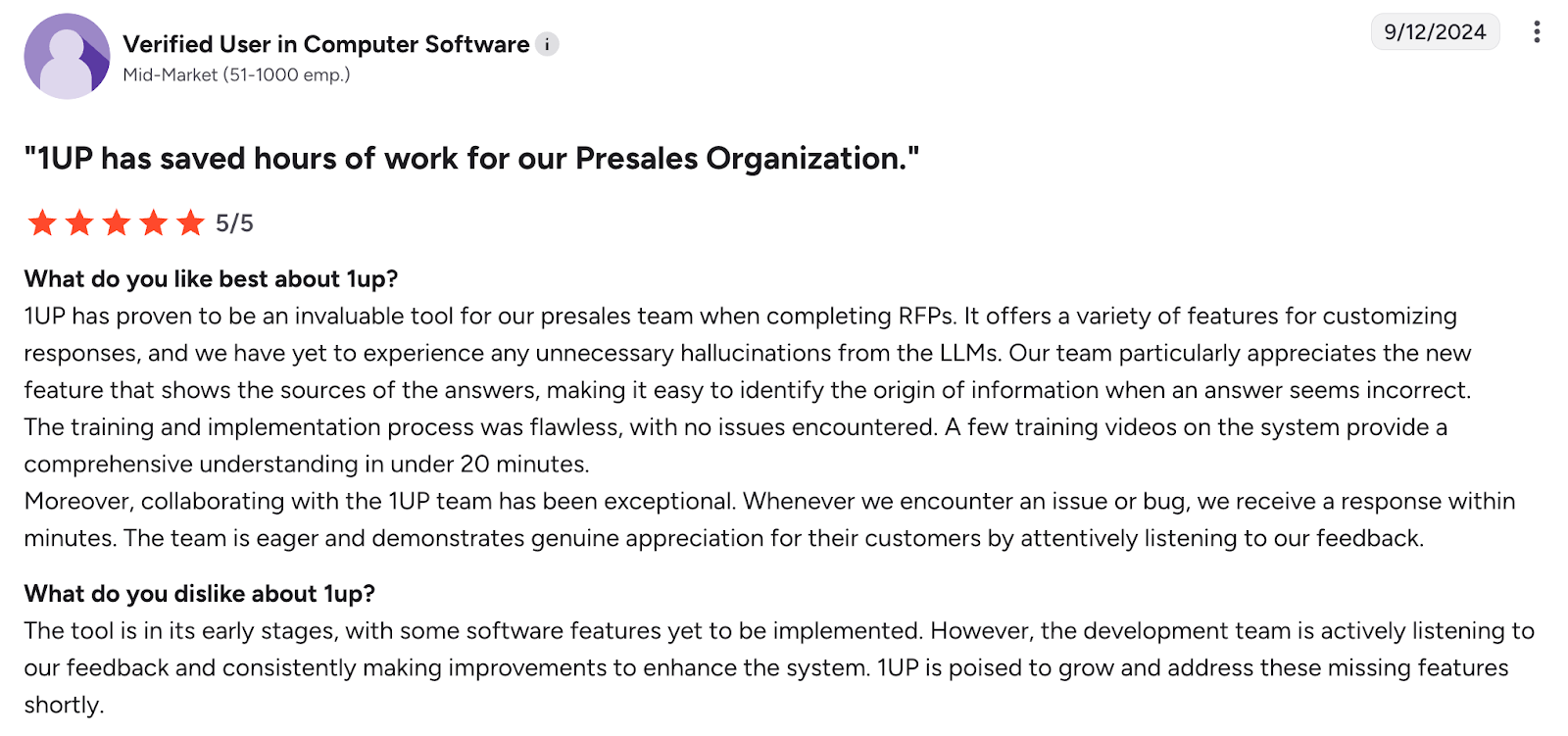
1Up is a good starting point for small teams, but doesn’t provide the scalability or advanced features needed for growing teams or more complex DDQs. It’s best suited for vendors with simpler needs.
Each DDQ software solution offers unique features and capabilities, but for vendors seeking speed, accuracy, and scalability, Inventive AI remains the top choice.
Whether you're a small team or a large enterprise, the right tool depends on your needs, but Inventive AI leads the way with its advanced AI-powered automation and market-leading performance.
The Role of Automation in DDQs
A Due Diligence Questionnaire (DDQ) is an important tool used by potential clients to evaluate a vendor's compliance, security, and overall reliability. These questionnaires are especially important in highly regulated industries like finance, healthcare, and tech, where vendors must meet stringent standards.
AI-driven DDQ automation is transforming how businesses respond to these assessments. Instead of manually sifting through documents and answering repetitive questions, AI-powered tools pull from existing data and documents to generate accurate, tailored responses.
By using AI, DDQ automation software not only speeds up the process but also enhances response quality and reduces errors, ensuring that vendors can respond quickly and confidently. AI ensures that responses are consistent and up-to-date, minimizing the risk of outdated information slipping through.
This automation allows teams to handle multiple DDQs more efficiently, giving them more time to focus on strategic tasks that drive business growth, ultimately accelerating deal closure and securing business relationships more effectively.
Also Read: Due Diligence Questionnaire (DDQ): A Complete Guide with Examples
Who Needs a DDQ Automation Software?
If you sell to regulated or security-sensitive customers, DDQs are part of the deal.
As these questionnaires get longer and more detailed, answering them manually starts to slow down deals and create avoidable risk. A DDQ automation software helps teams respond faster without losing accuracy.
1. Proposal managers and RFP teams
You handle DDQs alongside RFPs, security questionnaires, and one-off customer requests. A DDQ automation software helps you reuse approved answers, stay consistent across responses, and avoid rebuilding the same content for every new questionnaire.
2. Security, GRC, and compliance teams
You own SOC 2, ISO, and internal control documentation. DDQ automation keeps your security and compliance answers aligned, ensures the latest policies are used, and cuts down repeated follow-ups when customers ask for clarification or evidence.
3. Sales engineering and solutions teams
You step in when questions go deep into architecture, integrations, or data flow. With DDQ automation, you can quickly reference past responses and focus only on genuinely new or customer-specific questions instead of repeating explanations.
4. Legal and privacy teams
You review data handling practices, subprocessors, DPAs, and risk language. A centralized, approved answer library reduces repetitive legal reviews and ensures sensitive wording stays consistent across all DDQs.
5. Customer success and renewals teams
DDQs resurface during renewals, expansions, and security reassessments. DDQ automation helps you respond faster, maintain trust, and prevent compliance reviews from delaying ongoing revenue.
Why is DDQ Automation Important in 2026?
In 2026, businesses are facing increasing pressure to meet higher standards of compliance and security, especially when it comes to third-party vendors.
For vendors, ensuring your DDQ responses are timely, accurate, and reflect the latest compliance requirements is no longer optional; it's essential.
DDQ automation is important because it helps you:
- Save Time: With automation, you can complete DDQs in a fraction of the time, allowing your team to focus on higher-value tasks rather than repetitive data entry.
- Improve Accuracy: Automated software reduce the risk of human error, ensuring your responses are consistent, up-to-date, and aligned with your compliance standards.
- Stay Competitive: Clients expect faster, more accurate DDQ responses. Automation allows you to meet these expectations and stay ahead of competitors who are still relying on manual processes.
- Manage Risk: As the market of cyber threats and regulatory requirements grows more complex, automated software ensure that you’re always prepared with the latest, most accurate security information, reducing the risk of non-compliance.
DDQ automation isn’t just a luxury; it’s a critical tool for improving efficiency, ensuring compliance, and securing new business opportunities.
8 Key Features to Look for in DDQ Automation Software
Choosing the right DDQ automation software can make a big difference in how quickly and accurately you respond to questionnaires. When evaluating tools in 2026, focus on features that save you time, reduce errors, and improve the quality of your responses.
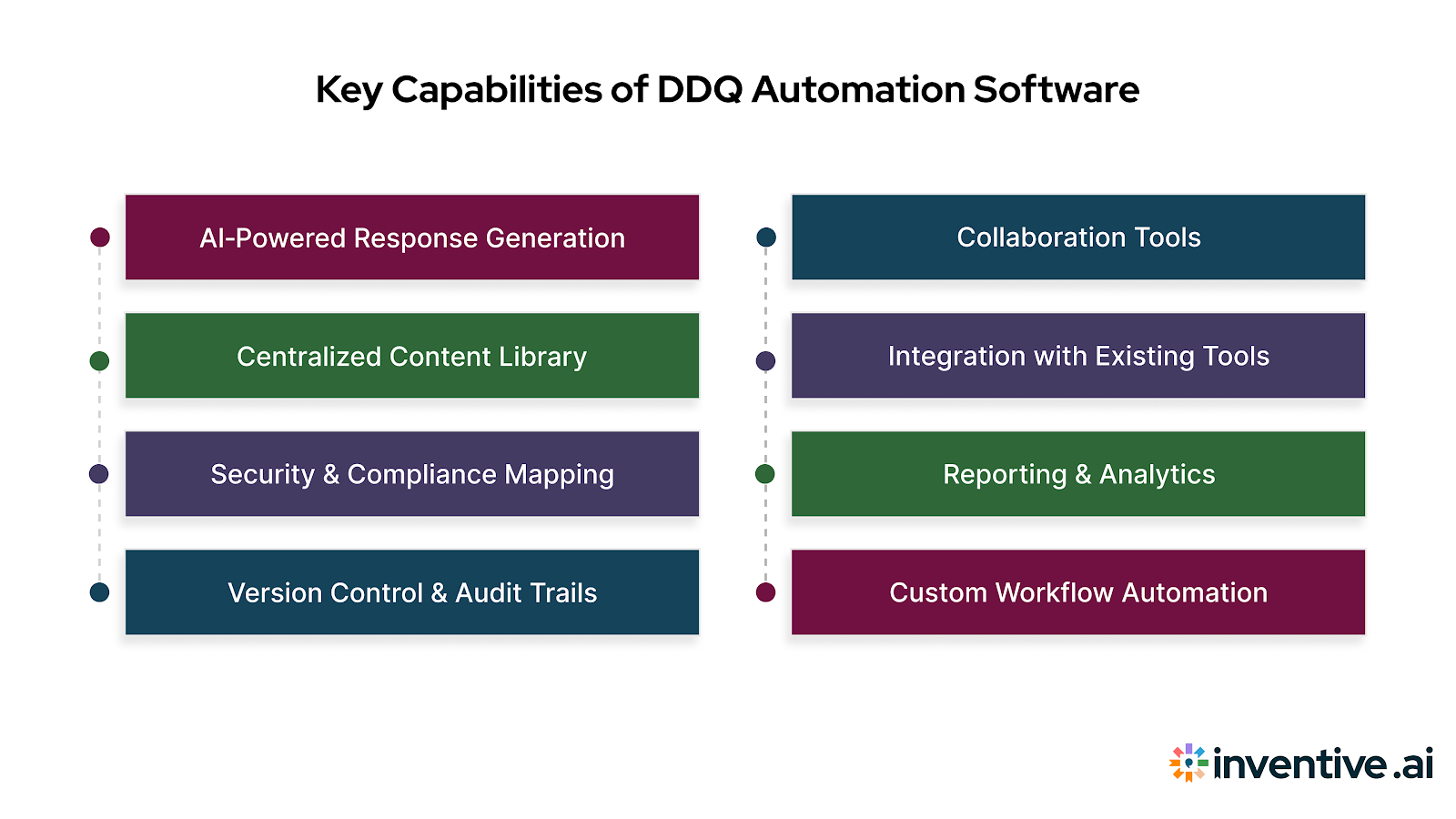
1. AI‑Powered Response Generation
Look for tools that use artificial intelligence to automatically generate accurate answers based on your existing data, templates, and documents. This reduces manual effort and ensures consistency across responses.
2. Centralized Content Library
A central repository lets you store approved DDQ answers, templates, legal language, compliance documents, and security data. This makes it easy to reuse verified content and keeps responses consistent.
3. Security & Compliance Mapping
The software should help manage and update your security posture, compliance frameworks, certifications, and attestations. This ensures you always provide current and accurate responses that reflect the latest standards.
4. Version Control & Audit Trails
Effective version control lets you track changes, manage edits, and see who updated what and when. Audit trails are especially useful during client reviews or security assessments.
5. Collaboration Tools
You and your team should be able to work on responses together, add comments, assign tasks, and review changes without endless email threads or file confusion.
6. Integration with Existing Tools
DDQ software should connect smoothly with your document storage, CRM, and compliance systems. This saves time by pulling information directly rather than requiring manual uploads.
7. Reporting & Analytics
Built-in reporting gives insights into your DDQ operations, like response turnaround times, common question patterns, and areas where your content library needs updating.
8. Custom Workflow Automation
Look for features that let you define workflows, such as review approvals, SME assignments, or client‑specific compliance checks, so nothing slips through the cracks.
Pro Tip: Choose software like Inventive AI that offers automated reminders and deadline tracking, ensuring you never miss a submission due date, even when managing multiple DDQs.
How to Choose the Best DDQ Software for Your Team?
Choosing the right DDQ software is key to improving your due diligence process. Here’s what to focus on when selecting the best tool for your team.
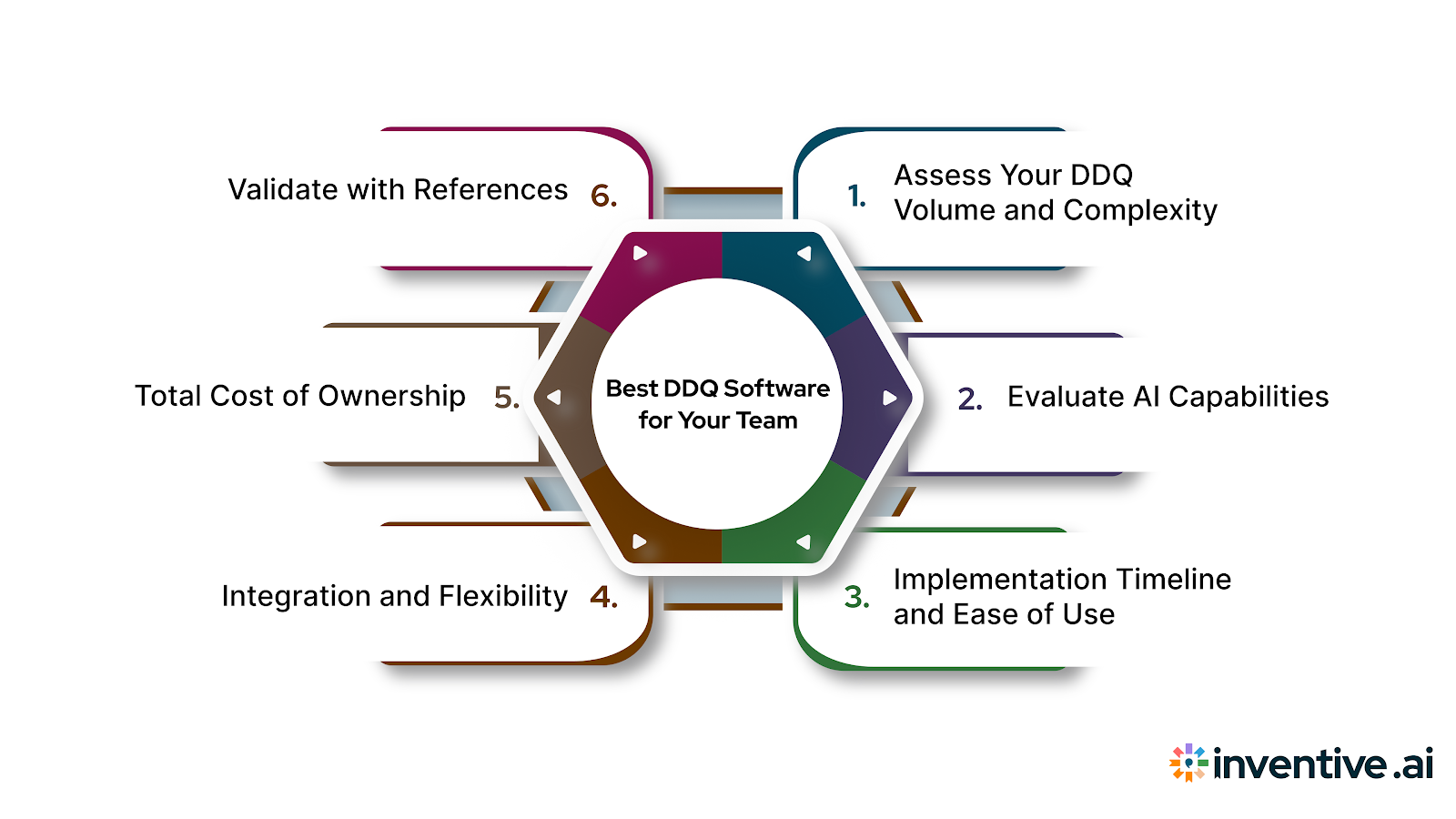
1. Assess Your DDQ Volume and Complexity
If your team handles fewer than 10 DDQs per month, manual templates may work. But if you manage more than 10 DDQs, automation becomes essential to save time and avoid errors.
- Question Complexity: Investment DDQs require detailed answers, while simpler security questionnaires are faster to complete.
- Unified Platform: If you handle RFPs, RFIs, and DDQs, choose a platform that integrates all your processes.
Match the software to your questionnaire’s complexity to avoid unnecessary costs.
2. Evaluate AI Capabilities
AI is a key feature in DDQ automation. Choose software that uses semantic search for contextual responses, not just keyword matching. Test the AI with real DDQ questions to see how well it performs.
AI-native platforms, like Inventive AI, offer more accurate responses and require less manual input.
3. Implementation Timeline and Ease of Use
Enterprise platforms may take 2-4 months to deploy. For small teams, AI-native platforms offer quicker setup and faster time-to-value.
Choose platforms that deploy quickly and require minimal setup.
4. Integration and Flexibility
Make sure the software integrates with your CRM (e.g., Salesforce) and document storage (e.g., Google Workspace). Also, check for API support for custom workflows and integration with security tools.
Ensure smooth integration with your existing tools to avoid extra work.
5. Total Cost of Ownership (TCO)
Look beyond license fees to account for:
- Implementation costs
- Ongoing maintenance
- Opportunity cost (manual workflows)
Automating DDQs can save significant time for teams, reducing the manual effort required to handle multiple DDQs each month
6. Validate with References
Ask for feedback from similar businesses and check reviews on platforms like Gartner, G2, or Capterra. Pay attention to common complaints or issues.
Also Read: Top Software for Automating Security Questionnaires in 2026
Maximizing the Impact of Your DDQ Software Implementation with These 5 Steps
Implementing DDQ automation software can significantly enhance your due diligence process, but only if you set it up correctly.
Here’s how to make sure you’re getting the most out of your new system:
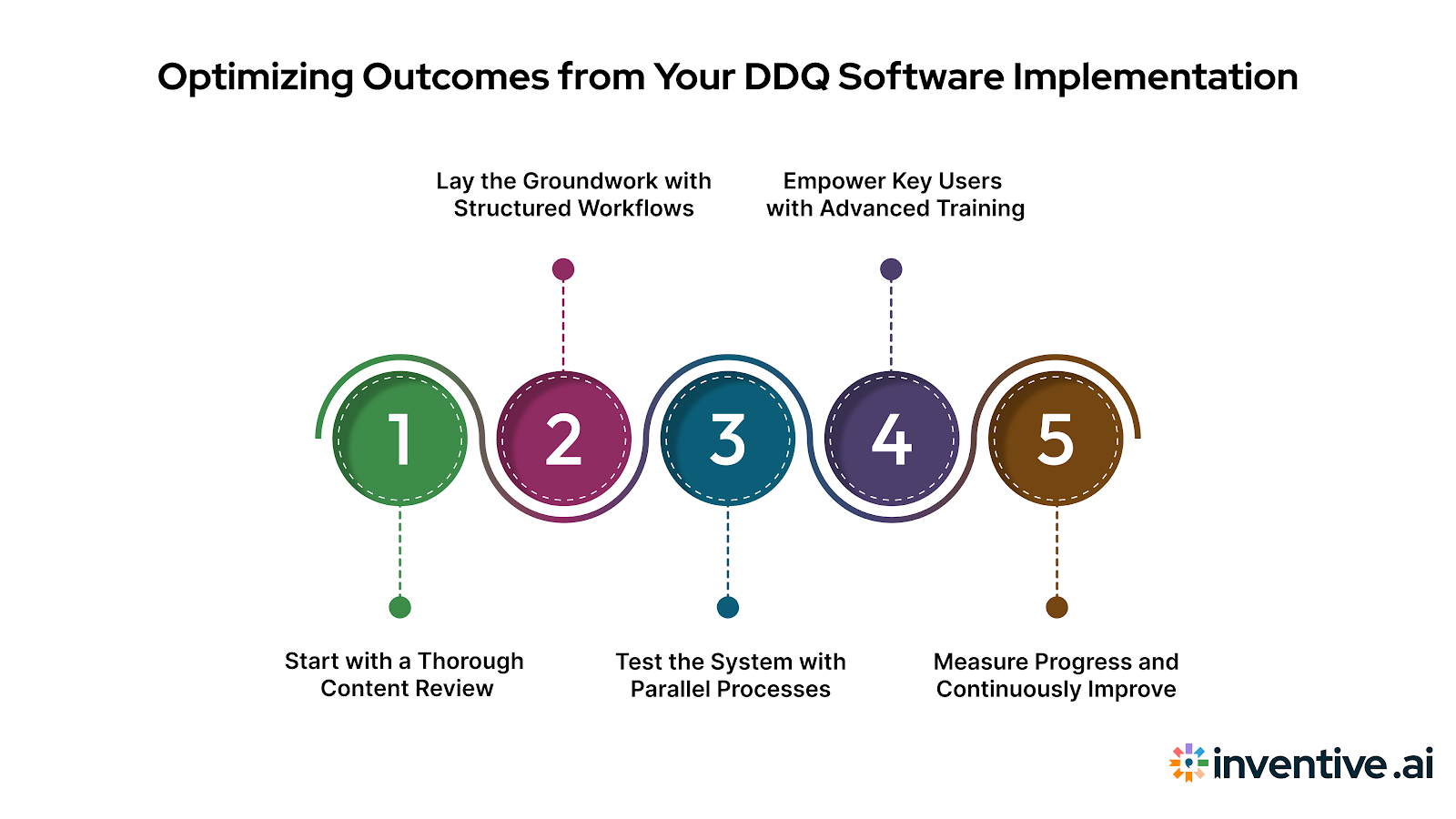
1. Start with a Thorough Content Review
Before getting into automation, take the time to audit your existing DDQ responses. Gather content from past proposals, shared drives, emails, and notes from SMEs. This step is crucial for success.
- Centralize and Update: Consolidate all approved answers in one place and ensure that the content is up-to-date, accurate, and compliant with current standards.
- Standardize Formatting: Make sure that your responses are formatted consistently to maintain professionalism and readability across all DDQs.
- Focus on High-Impact Questions: Prioritize the most frequently asked questions (20% of the questions) that you’ll encounter 80% of the time. This targeted approach saves time in the early stages, while more infrequent questions can be handled later.
A solid content foundation leads to more accurate AI-generated responses that save time and increase efficiency in the long run.
2. Lay the Groundwork with Structured Workflows
Define your approval processes and workflows before going live. Establishing these early helps reduce confusion once automation kicks in.
- Define Roles and Responsibilities: Identify who is responsible for reviewing technical, legal, security, and financial responses. Make sure everyone knows their role in the process.
- Set SLAs for SMEs: Setting clear timelines for Subject Matter Experts (SMEs) helps manage expectations and ensures timely responses.
- Create Escalation Paths: Establish clear escalation paths for new or complex questions, so they are handled efficiently and without delays.
Having a structured workflow ensures smoother automation and better overall performance.
3. Test the System with Parallel Processes
During the initial phase, run manual processes alongside automation for the first few DDQs. This creates a safety net while the system learns and adapts.
- Compare Results: Track the speed and accuracy of both manual and automated responses. This allows you to measure improvements and pinpoint areas for optimization.
- Adjust as Needed: Use early feedback to tweak workflows and fix any content gaps or friction points.
Running parallel processes ensures you can transition to full automation smoothly, building confidence across your team.
4. Empower Key Users with Advanced Training
Identify a few power users within your team to receive in-depth training. These individuals will act as champions, driving adoption and providing internal support to other team members.
- Document Workflows: Tailor vendor manuals to fit your organization’s specific processes, ensuring your team can easily follow along.
- Offer Peer-to-Peer Support: Encourage champions to help their peers by offering office hours or Q&A sessions, which is often more effective than formal training.
This approach ensures that knowledge spreads quickly across your organization, enabling a smoother transition to your new system.
5. Measure Progress and Continuously Improve
Once the system is live, it’s important to track performance and optimize over time.
- Monitor Response Times: Track the time it takes to complete DDQs before and after automation. This will show the time savings and efficiency improvements.
- Evaluate AI-Generated Content: Look at how often content needs to be edited. A low edit rate indicates high-quality AI responses, while frequent edits suggest areas for improvement.
- Collect Feedback: Gather feedback from users regularly to identify pain points and areas where the system can be fine-tuned.
By continuously measuring, iterating, and expanding your content library, you ensure that the system gets better and more accurate with each use.
Also Read: Best AI Tools for Sales Enablement in 2025
Avoid These 5 Common DDQ Automation Software Implementation Pitfalls
Even the top DDQ software won’t work for your team if it’s not implemented correctly. Here are the mistakes to avoid:
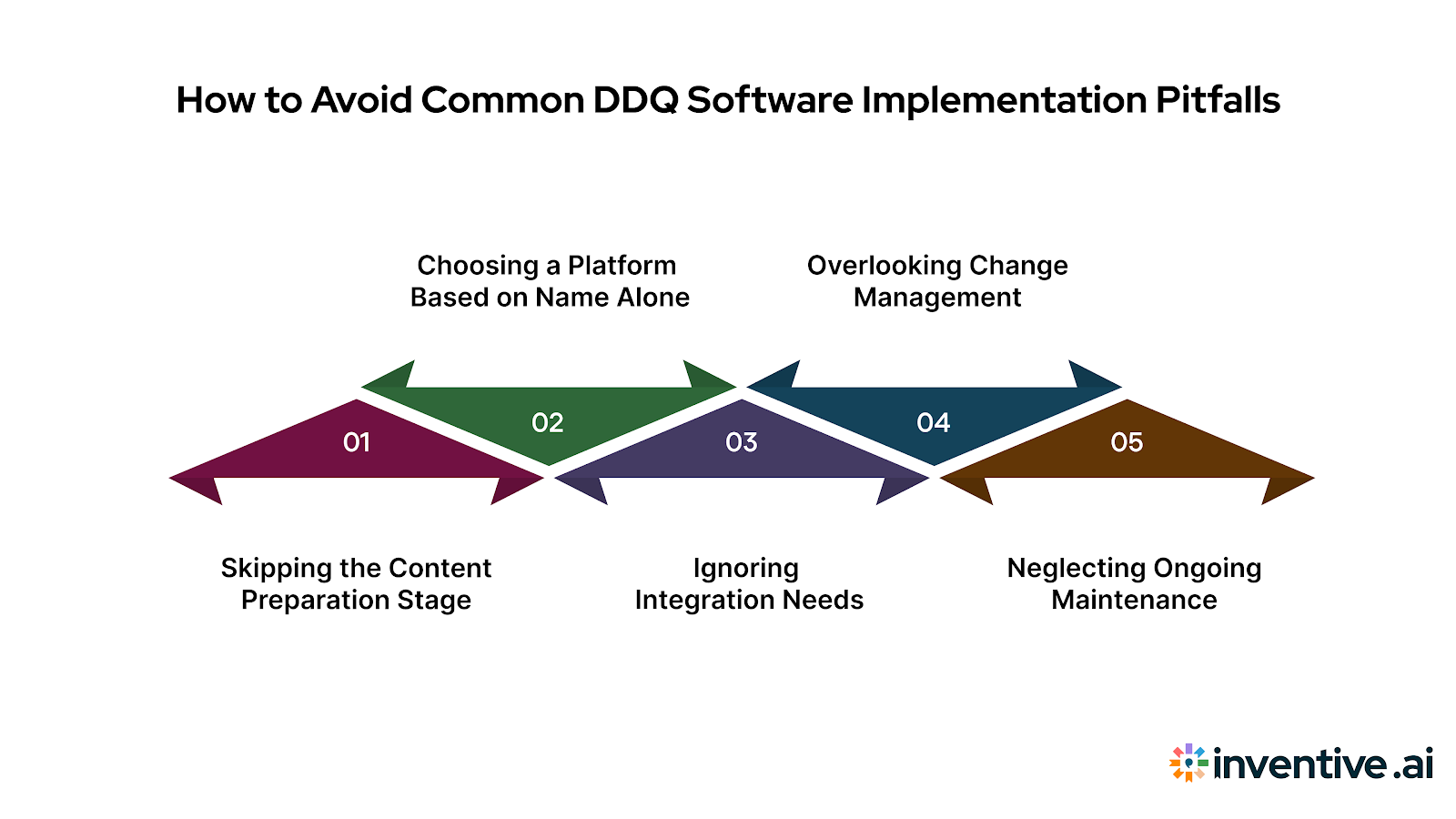
AI-driven DDQ platforms can’t work magic, if you input poor or incomplete content, the results will be just as ineffective. Investing time in properly consolidating and updating your content upfront is crucial for success.
- Invest Time Upfront: Dedicate enough resources to gather, update, and standardize your responses.
- Quality Over Quantity: Focus on accuracy and compliance over sheer volume. High-quality responses from the start lead to better automation results.
Skipping this critical step will result in low-quality automated responses that could hurt your reputation and delay deals.
2. Choosing a Platform Based on Name Alone
Just because a software platform is well-known doesn’t mean it’s the best fit for your needs. Enterprise-level platforms may be too complex and costly for smaller teams with simpler DDQs.
- Match Platform to Your Needs: Choose a platform that suits the scale of your team and the complexity of your DDQs. Don’t get distracted by extensive feature lists that may not be necessary for your use case.
- Prioritize Functionality Over Popularity: Focus on platforms that directly address your specific pain points rather than picking the “biggest name” in the industry.
Choosing the wrong platform leads to higher costs and unnecessary complexity.
3. Ignoring Integration Needs
One of the biggest mistakes teams make is selecting DDQ software without fully understanding its integration requirements. If your platform doesn’t integrate smoothly with your CRM, document management systems, or security tools, you’ll end up with manual workarounds that defeat the purpose of automation.
- Map Out Integration Needs Early: Identify key systems that need to be connected before evaluating software options.
- Test Integrations: During demos, validate that the platform works with your actual tools (not just in a generic demo environment).
Missing critical integrations can lead to inefficiency and wasted time, so make this a priority during the evaluation phase.
4. Overlooking Change Management
New technology alone won’t drive results, your team needs to understand why the change is happening and how it benefits them. Without proper adoption, even the best DDQ automation software will fail.
- Communicate the Why: Ensure everyone understands how the new system will make their jobs easier and improve overall efficiency.
- Involve Key Users Early: Get buy-in from stakeholders and power users early in the process to ensure smooth adoption.
- Celebrate Early Wins: Highlight time savings and quality improvements to build momentum and keep the team motivated.
Effective change management ensures a smoother transition and quicker adoption of the new system.
5. Neglecting Ongoing Maintenance
Once your DDQ software is up and running, don’t forget about it. Content and compliance requirements change over time, and without regular updates, your responses will become outdated.
- Assign Ownership for Content Updates: Designate someone to regularly review and update your content library.
- Schedule Routine Reviews: Set quarterly or bi-annual content reviews to ensure everything stays accurate and compliant.
Regular maintenance is important to keeping your DDQ software effective over the long term.
Smarter, Faster, and More Accurate DDQ Responses with Inventive AI
By now, it’s clear that DDQs are no longer a one-off compliance task. They directly affect how fast deals move, how much trust you build with buyers, and how consistently your security and compliance story shows up across customers.
The tools we covered each solve parts of the problem, but many still depend heavily on manual effort, static libraries, or surface-level automation. As DDQs grow longer and more detailed, those gaps start to slow you down.
This is where Inventive AI clearly stands apart.
Inventive AI is built specifically for vendors that need to respond to DDQs at scale without sacrificing accuracy or control. Its AI RFP Agent goes beyond basic content reuse by understanding context, detecting conflicts, flagging outdated answers, and maintaining a single source of truth across security, legal, and compliance responses. The result is not just faster drafts, but cleaner, more reliable submissions.
Teams using Inventive AI consistently see:
- 50% higher win rates from clearer, more consistent responses
- 90% faster DDQ turnaround without last-minute scrambling
- 2× higher response quality compared to traditional RFP software
- 95% accuracy with 0% hallucination
- 66% of responses required no edits at all
With AI-powered RFP response software, Inventive AI replaces manual coordination, repeated reviews, and fragmented content with a system designed for precision and speed. If your DDQs touch revenue, renewals, and trust, Inventive AI gives you a better way to respond confidently, consistently, and on time.
FAQs
1. How does DDQ automation improve compliance and risk management?
DDQ automation helps ensure responses are always aligned with the latest security protocols and regulatory standards. By flagging outdated content in real time and ensuring responses are up-to-date, businesses can reduce the risk of non-compliance and avoid potential penalties.
2. What industries benefit most from DDQ automation?
Industries with high regulatory demands, such as finance, healthcare, and technology, benefit most from DDQ automation. These industries often deal with complex, sensitive data and must maintain high compliance standards, making automated DDQs crucial for efficiency and accuracy.
3. Can DDQ automation tools integrate with existing CRM and document management systems?
Yes, many DDQ automation tools, including Inventive AI, offer smooth integrations with CRM systems like Salesforce, as well as document management tools. This ensures that your DDQ responses remain consistent and up-to-date, streamlining workflows and reducing the need for manual data entry.
4. How does AI-driven DDQ automation handle customer-specific questions?
AI-driven DDQ tools, such as Inventive AI, can tailor responses to customer-specific questions by using advanced contextual understanding. Unlike basic keyword matching, these tools comprehend the nuances of each question, delivering highly relevant, accurate, and personalized responses without manual input.
5. How can DDQ automation impact the time-to-market for vendor contracts?
By automating repetitive tasks and reducing manual efforts, DDQ automation significantly shortens the time required to complete DDQs. This allows vendors to submit proposals and contract documents faster, enabling them to meet deadlines and close deals more efficiently, ultimately reducing time-to-market for vendor contracts.

90% Faster RFPs. 50% More Wins. Watch a 2-Minute Demo.
Tired of watching deal cycles stall due to manual questionnaire back-and-forth, Dhiren co-founded Inventive AI to turn the RFP process from a bottleneck into a revenue accelerator. With a track record of scaling enterprise startups to successful acquisition, he combines strategic sales experience with AI innovation to help revenue teams close deals 10x faster.
Knowing that complex B2B software often gets lost in jargon, Hardi focuses on translating the technical power of Inventive AI into clear, human stories. As a Sr. Content Writer, she turns intricate RFP workflows into practical guides, believing that the best content educates first and earns trust by helping real buyers solve real problems.


